Nvidia GeForce RTX 3080 Review
Nvidia claims the new GeForce RTX 30 graphics series provides a giant leap in raw graphics performance, based on the visitor'due south latest Ampere architecture and manufactured on Samsung's 8nm procedure. On newspaper, the GeForce RTX 3080 certainly looks mighty, packing an insane 28 billion transistors -- a 50% increment over the RTX 2080 Ti, the old world's fastest gaming GPU.
Today we tin can finally show you lot how the GeForce RTX 3080 performs and yous can of class expect a boatload of benchmark data in this review. There's plenty of architectural information we could go over and nosotros could too explore the Founders Edition card's blueprint, but both of those things easily warrant a dedicated article. Right now it'due south clear most of you volition want the criterion data first, then we'll cover the hardware nuts and then spring into the results.
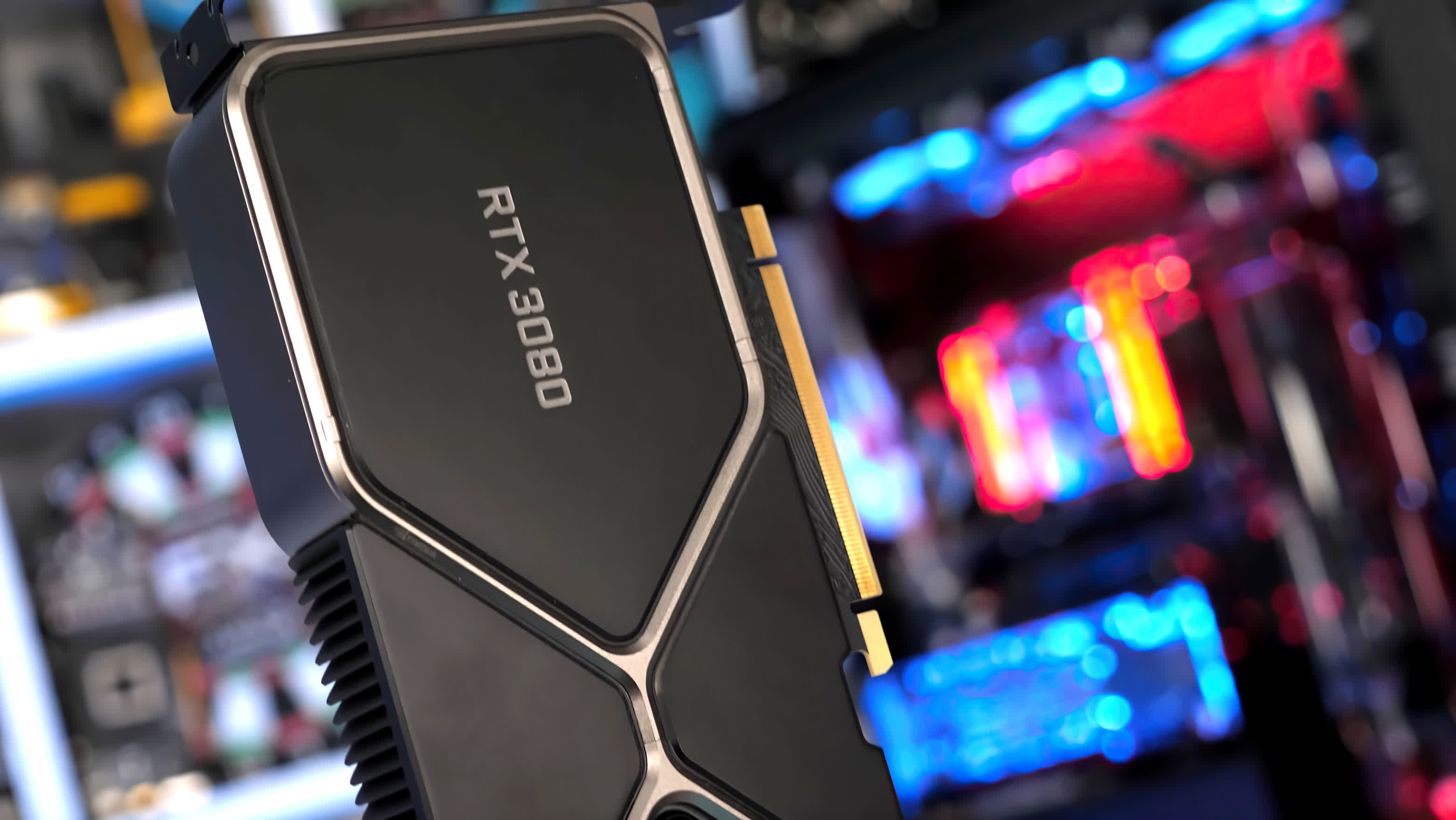
With Ampere, a big change has been fabricated to the streaming multiprocessor (SM) and its 32-bit floating point or FP32 throughput when compared to GeForce 20 Turing GPUs. Nvidia doubled the throughput by designing a new datapath for FP32 and INT32 operations which results in all four partitions combined executing 128 FP32 operations per clock.
Nvidia says this helps improve gaming operation and while true, its effectiveness depends on a few things which we will explore in this review. Hither's a side-by-side specification comparing betwixt the RTX 3080, 2080 and 2080 Ti.
| GeForce RTX 3080 | GeForce RTX 2080 | GeForce RTX 2080 Ti | |
| Price (MSRP) | $700 | $1200 | |
| Release Date | September 2022 | September 2022 | |
| Process | Samsung 8N | TSMC12FFN | |
| Transistors (billion) | 28 | 13.6 | xviii.6 |
| Die Size (mm2) | 628.4 | 545 | 754 |
| Core Config | 8704 / 272 / 96 | 2944 / 184 / 64 | 4352 / 272 / 88 |
| Core Clock Frequency | 1440 / 1710 MHz | 1515 / 1710 MHz | 1350 / 1545 MHz |
| Memory Capacity | 10 GB | 8 GB | 11 GB |
| Memory Speed | 19 Gbps | 14 Gbps | |
| Memory Type | GDDR6X | GDDR6 | |
| Coach Type / Bandwidth | 320-fleck / 760 GB/s | 256-bit / 448 GB/s | 352-fleck / 616 GB/s |
| TGP | 320 watt | 215 watt | 250 watt |
When compared to the 2080 Ti we're looking at the same number of SM units with the RTX 3080, just thank you to the 2x FP32 redesign, Nvidia is challenge a 100% increase in CUDA cores. That doesn't mean the 3080 will be 100% faster than the 2080 Ti, but information technology will offer a reasonable performance uplift. Bespeak is, you can't make a meaningful CUDA core count comparison between different generations.
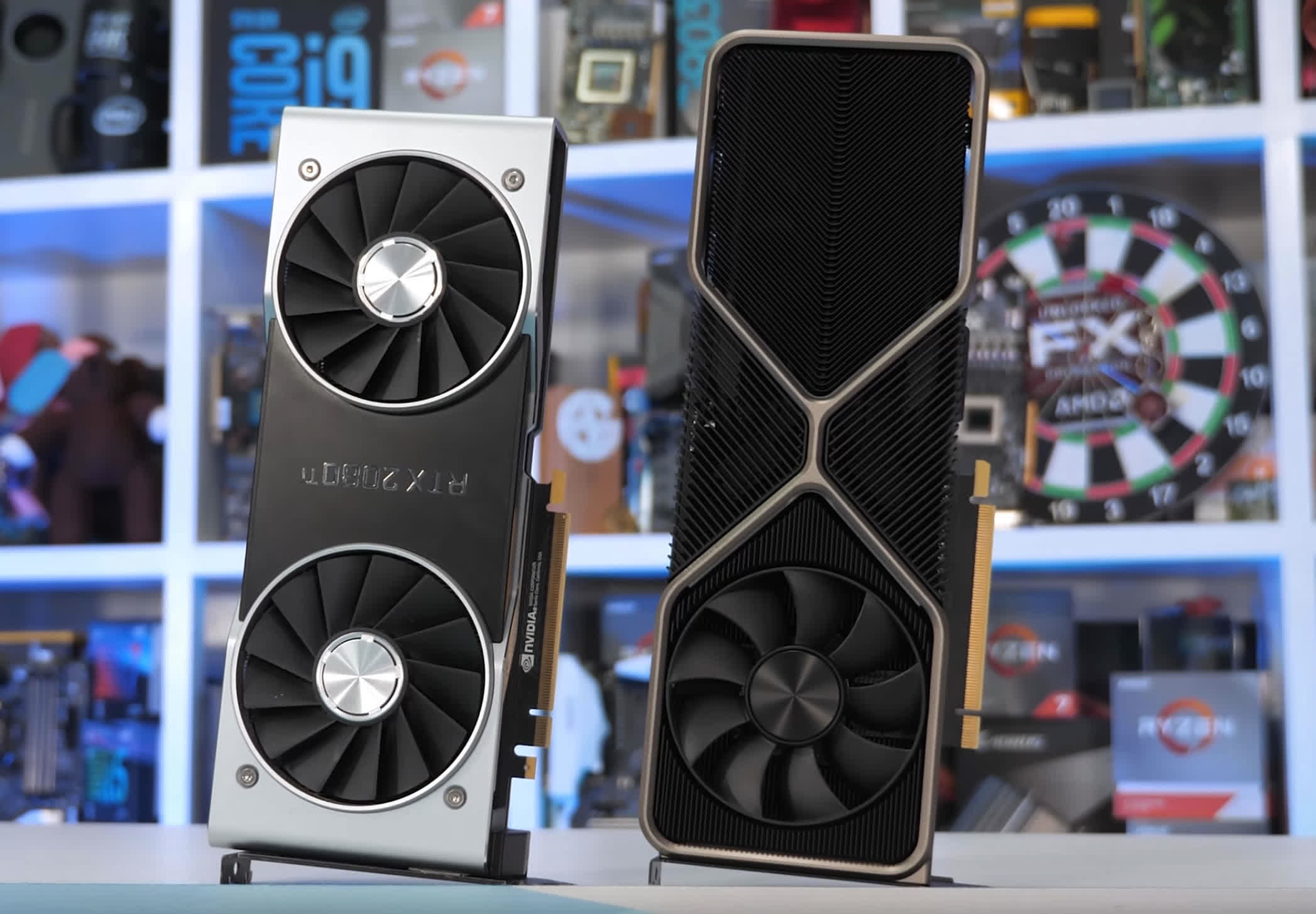
Comparing the memory configuration is a more straightforward thing. The RTX 2080 Ti has an 11 GB memory buffer, while the RTX 3080 offers 10 GB. This is still a 25% increment over the vanilla RTX 2080, but it's surprising since you'd look a larger buffer for a bill of fare targeting 4K gaming.
The memory bandwidth has been greatly increased thanks to the utilise of 19 Gbps GDDR6X memory on a 320-bit broad bus, resulting in a peak bandwidth of 760 GB/s, a 23% increase from the 2080 Ti and 70% from the 2080.
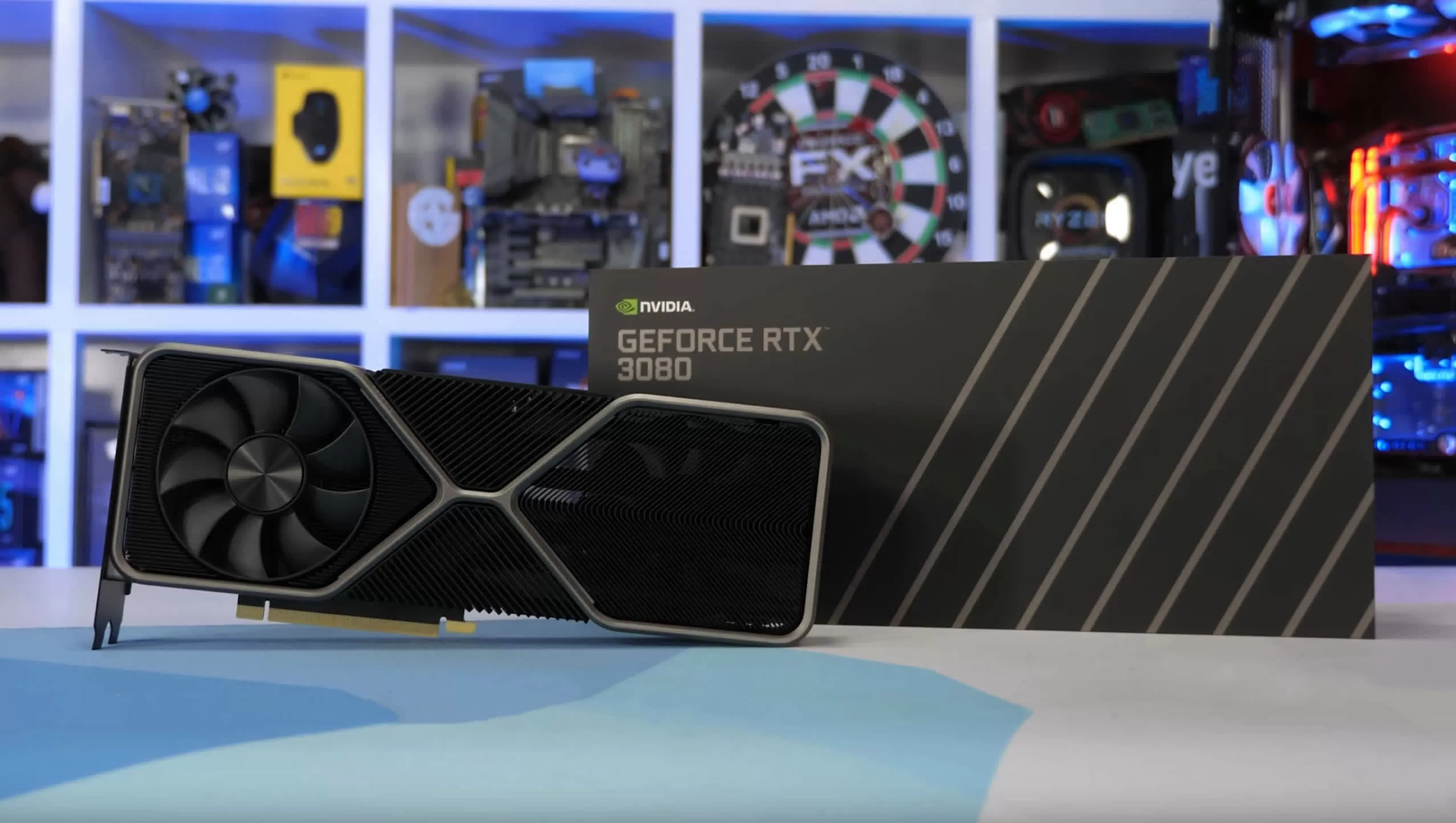
It'south also worth noting the increase in TGP (Total Graphics Ability) from 215 watts for the RTX 2080 to 320 watts for the RTX 3080, a massive 49% increase and even a 28% increase from the 2080 Ti. It will be interesting to see how well the RTX 3080 Founders Edition graphics card deals with all that power once it'southward converted to estrus energy.

But enough well-nigh all that, it's time to get into the bluish bar graphs. For testing we're using our Ryzen nine 3950X examination system, featuring four sticks of depression latency DDR4-3200 retentivity operating in a dual-rank configuration. We also accept some Cadre i9-10900K and PCI Express 3.0 vs 4.0 preliminary information that we'll wait at, so let's get to it.
Benchmarks
Starting with Death Stranding, nosotros're looking at a 20% functioning increment over the 2080 Ti at 1440p and a 41% increment over the RTX 2080. Keen at all, simply not the 80% we suspect many of you lot were expecting to see. We should annotation the margins were identical on our Core i9-10900K test system.
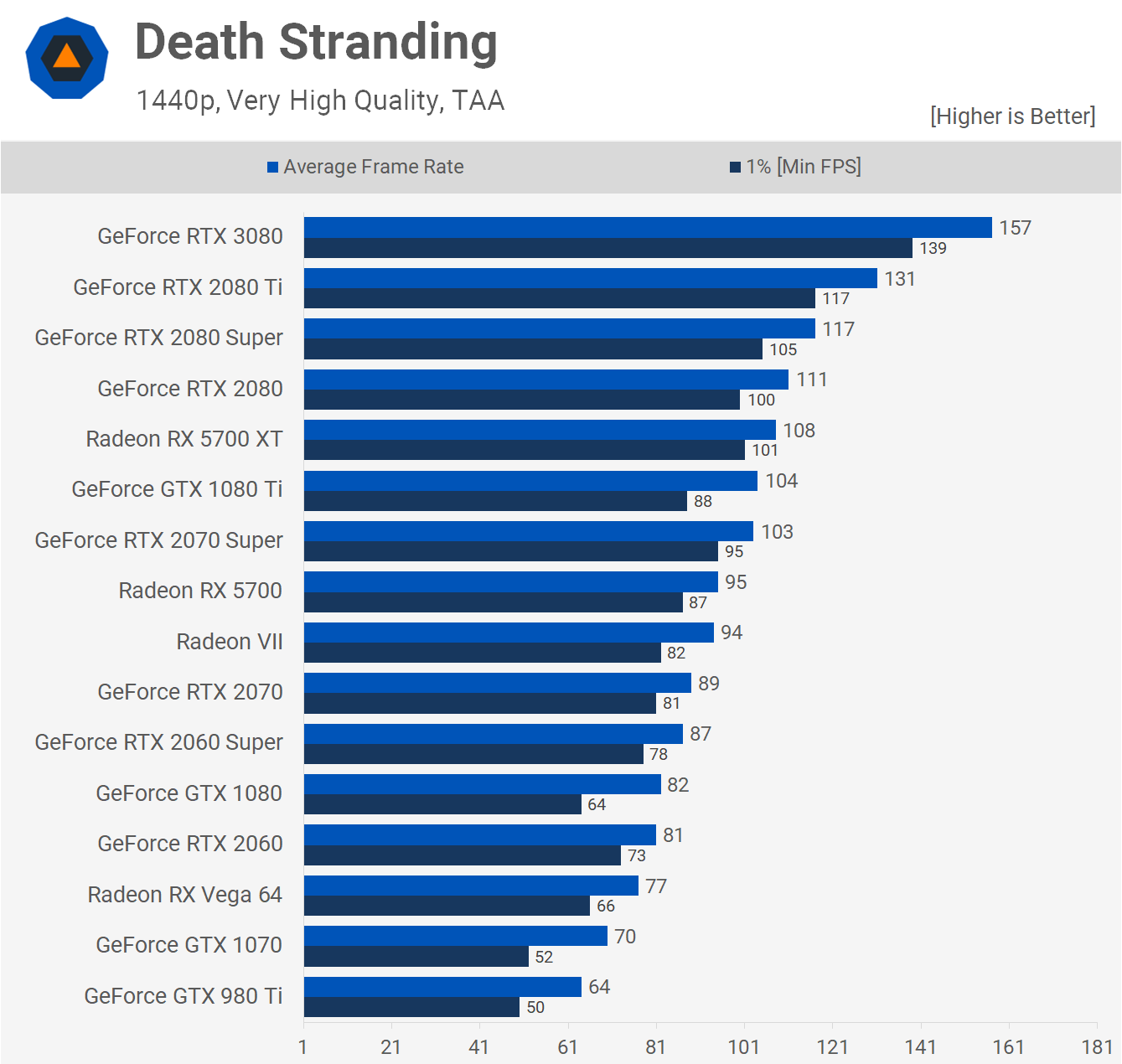
Moving to 4K does improve margins for the RTX 3080 and now information technology'southward 29% faster than the 2080 Ti and 62% faster than the vanilla 2080, so that's starting to become upwards there. As well 107 fps on average at 4K is a very impressive result, the game looked spectacular and every bit you might imagine, was very smooth.

Unfortunately the performance gains in Microsoft Flight Simulator 2022 at 1440p are very weak and this is largely due to our choice to employ the 3950X, the game just doesn't utilize Ryzen processors very well right now and is in desperate demand of low-level API back up.
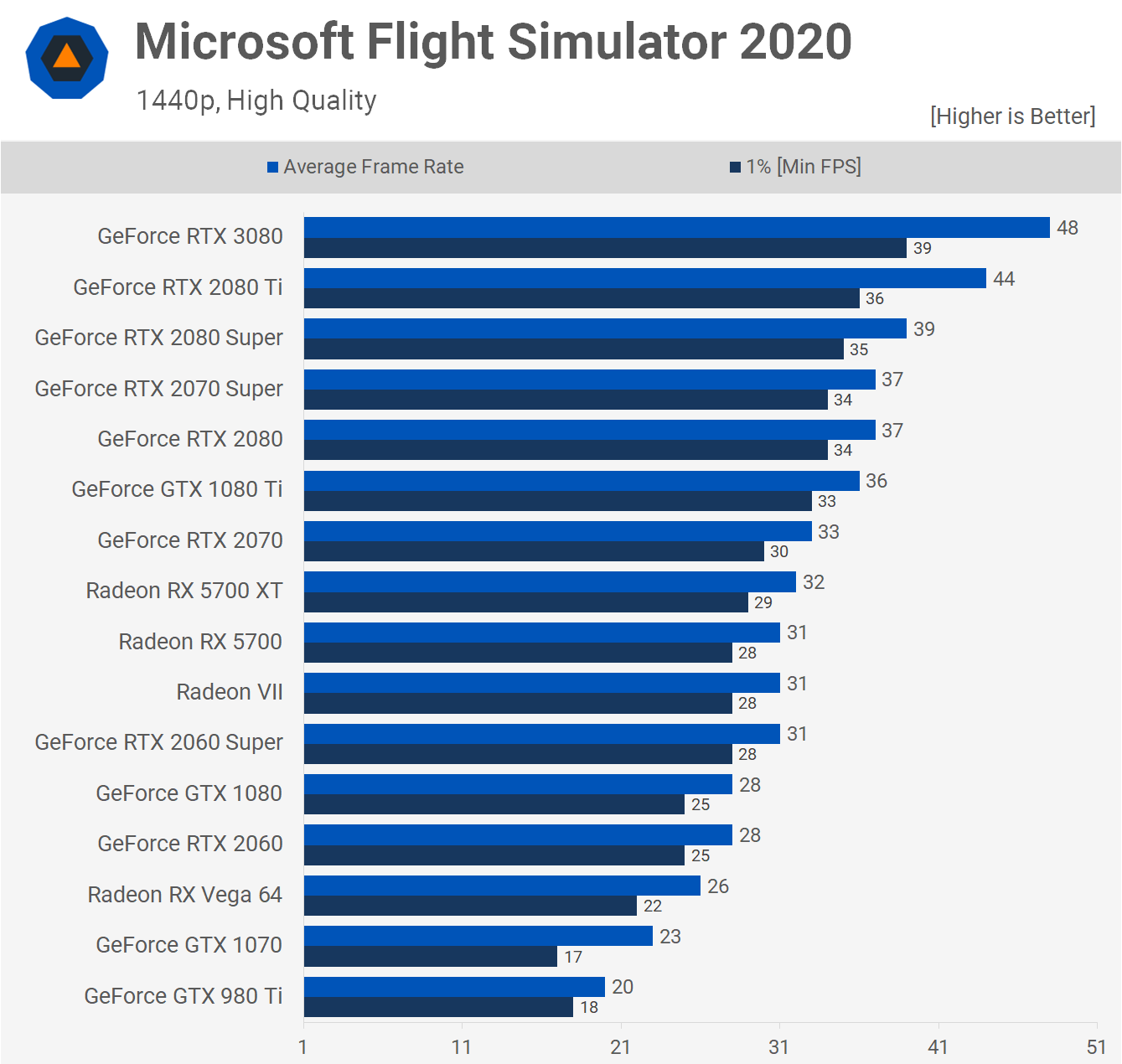
Here we're looking at a measly 9% increment over the 2080 Ti and 30% over the 2080, simply even with an Intel CPU you're still merely looking at a 20% increase over the 2080 Ti.

Jumping to 4K does assist alleviate the CPU bottleneck and the RTX 3080 was 29% faster than the 2080 Ti. We saw the same frame rates on our 10900K exam organisation. And then with an RTX 3080 you're looking at merely 40 fps at 4K over big cities in Flight Simulator 2022.

Shadow of the Tomb Raider was one of the games that impressed me the nearly two years ago when testing the 2080 Ti, the 4K experience was astonishing. At 1440p the RTX 3080 is seen to be 28% faster than the 2080 Ti and 57% faster than the 2080, at 154 fps on average under these conditions is very impressive.
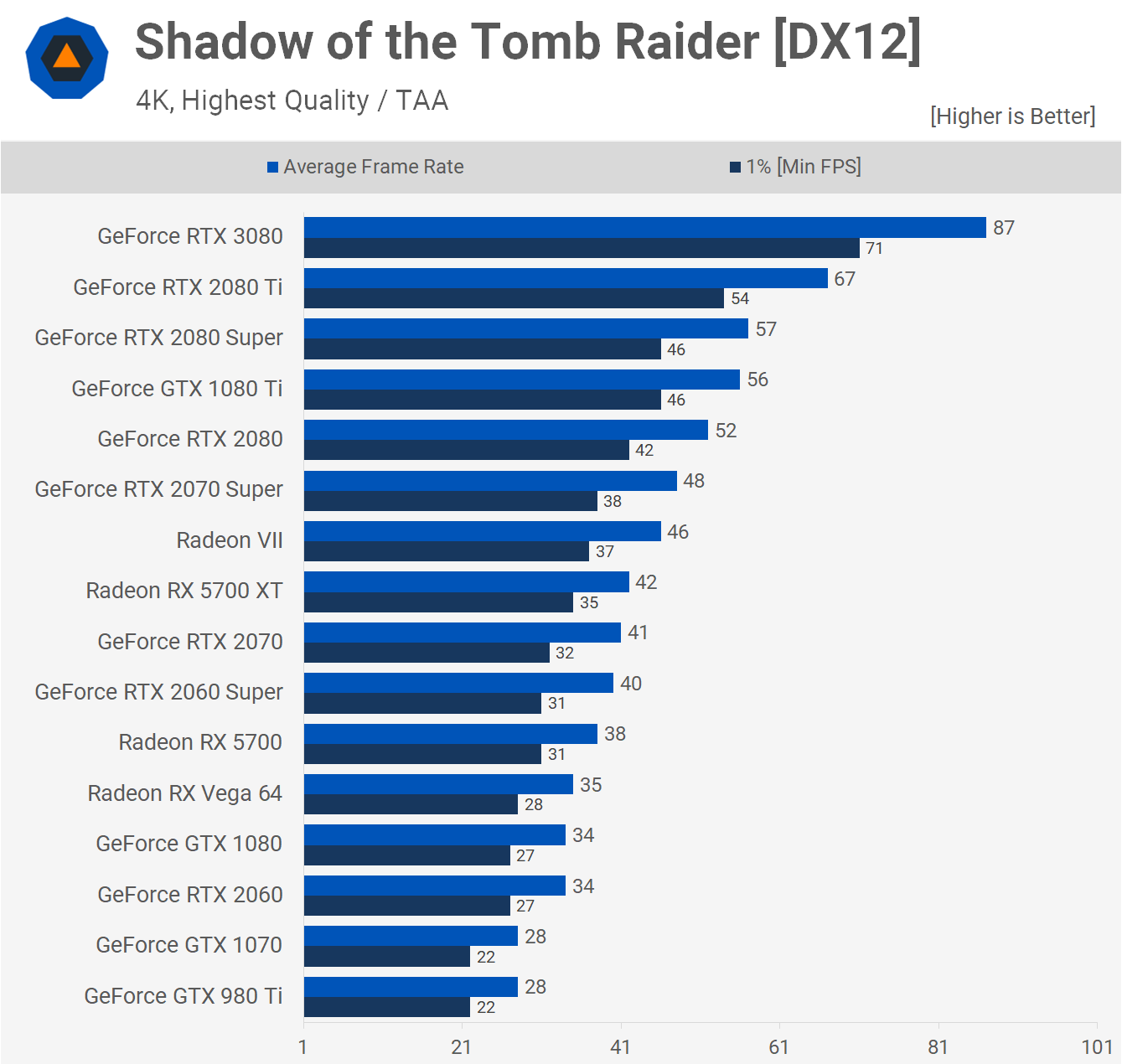
Then at 4K we see that 87 fps on average is possible with the RTX 3080, pretty impressive stuff. That's a 67% increase over the 2080 and 30% over the 2080 Ti, so both are quite impressive gains, particularly given this is a $700 GPU.

Moving on to Tom Clancy's Rainbow Six Siege, nosotros're looking at a 28% increase over the 2080 Ti and 63% over the standard 2080 or 54% over the Super version.
We're probably not going to reference the 2080 Super much since information technology offered a mere 5% increment over the original model and most of you bought the original.

Now at 4K nosotros're looking at a 29% increase over the 2080 Ti and 71% over the 2080. Those are some pretty solid gains. It as well ways whereas the 2080 Ti averaged 135 fps the 3080 saw 1% lows of 152 fps, providing a better experience for loftier refresh rate gaming at 4K.
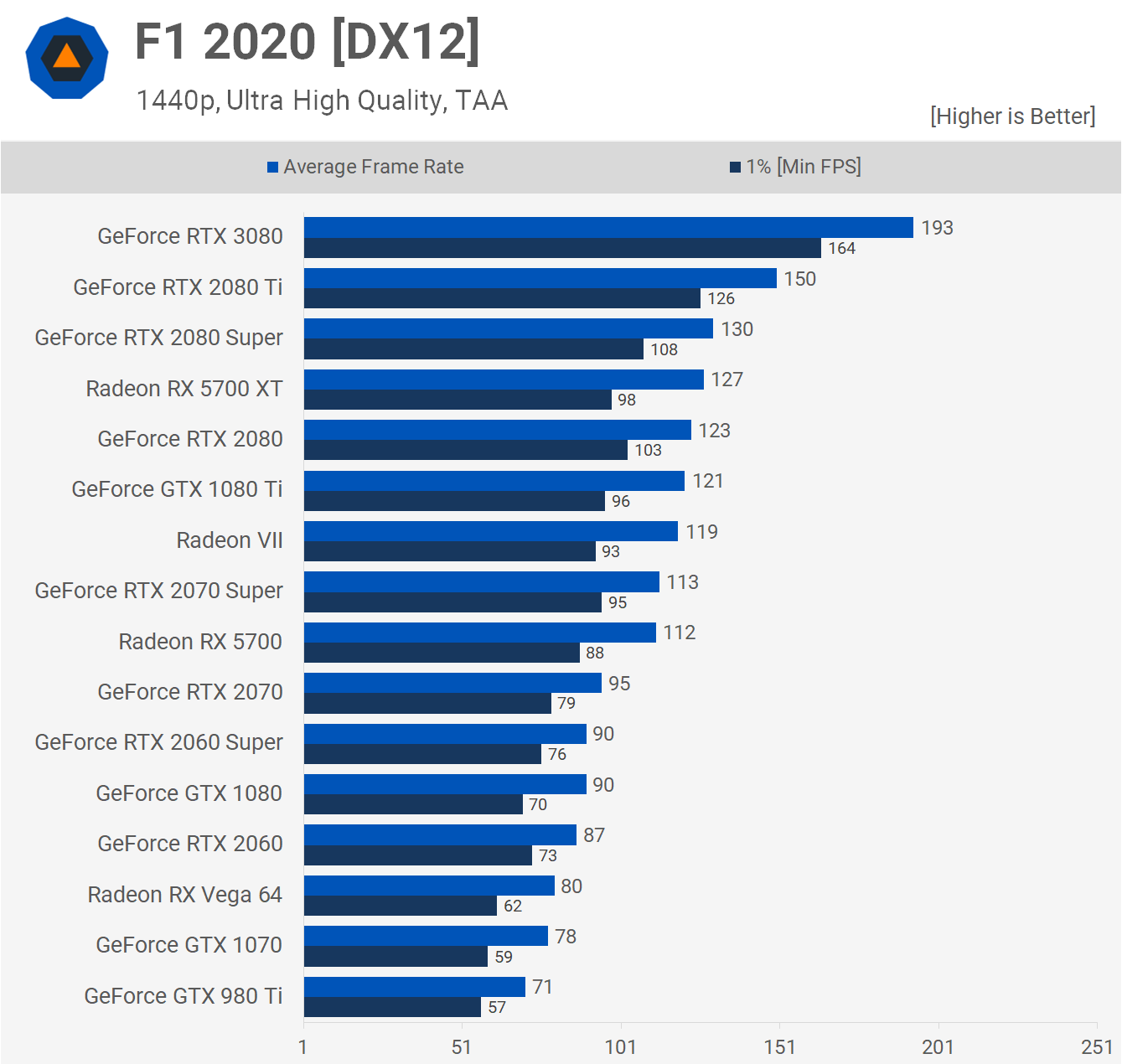
Next upward we have F1 2022 and here nosotros're seeing what has go a fairly typical 30-ish % boost over the 2080 Ti at 1440p, this time it'southward a 29% performance uplift to be verbal. That meant the RTX 3080 was 57% faster than the vanilla 2080, and so another solid performance uplift in that location.
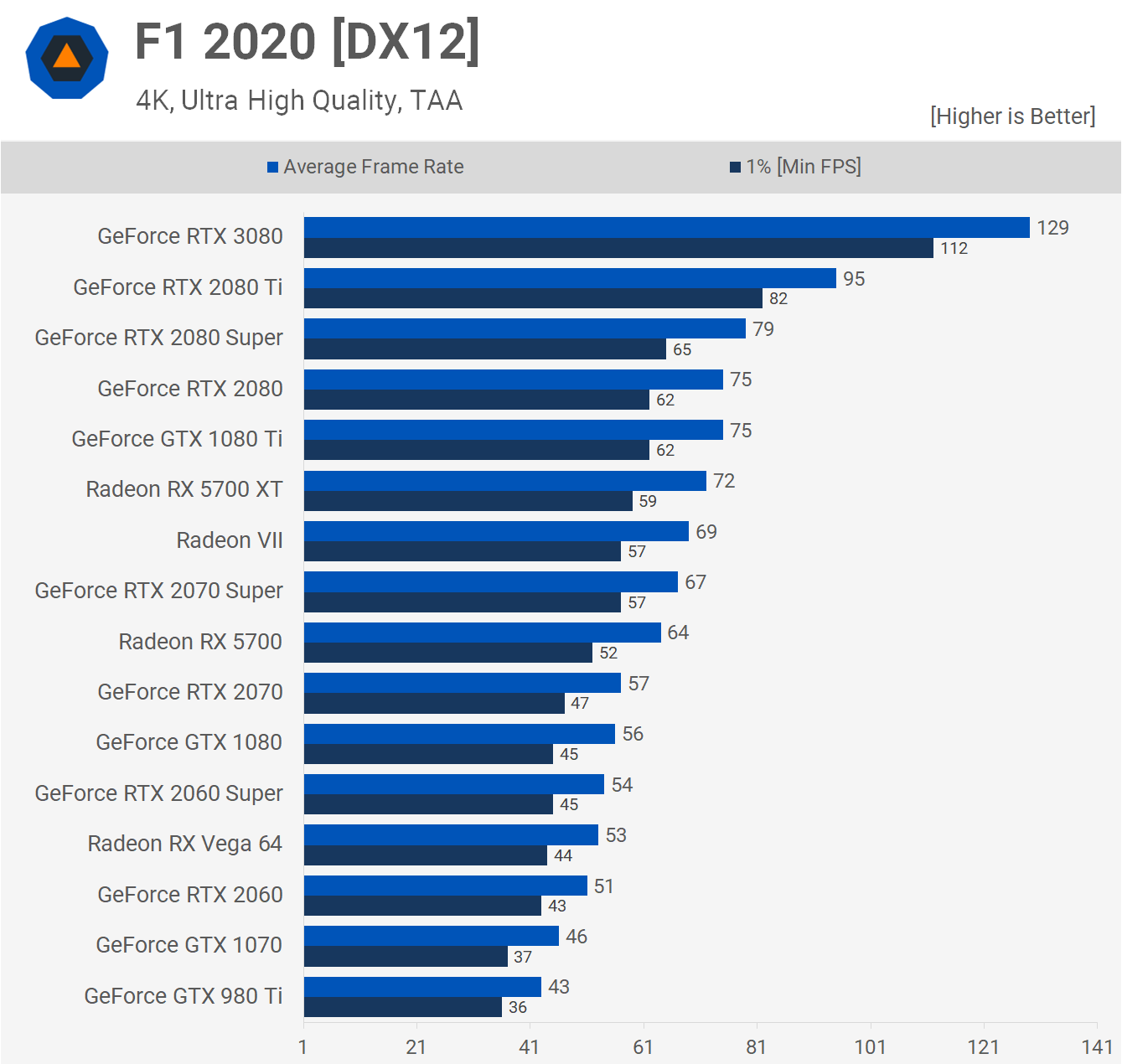
Once once again nosotros see the margins grow a picayune at 4K and now the RTX 3080 is 36% faster than the 2080 Ti and 72% faster than the 2080, which is far more significant and much closer to the eighty% that'southward been put out there since the proclamation.
Information technology's also worth noting that we're talking most 129 fps on average at 4K, that'due south staggering performance.

Moving on to Gears 5, we see "mild" operation gains at 1440p. An 18% boost from the 2080 Ti and 37% over the standard 2080. It will depend on your perspective merely for this title, we're talking about a 34% improvement over the 3+ year-old GTX 1080 Ti which also sold for $700.
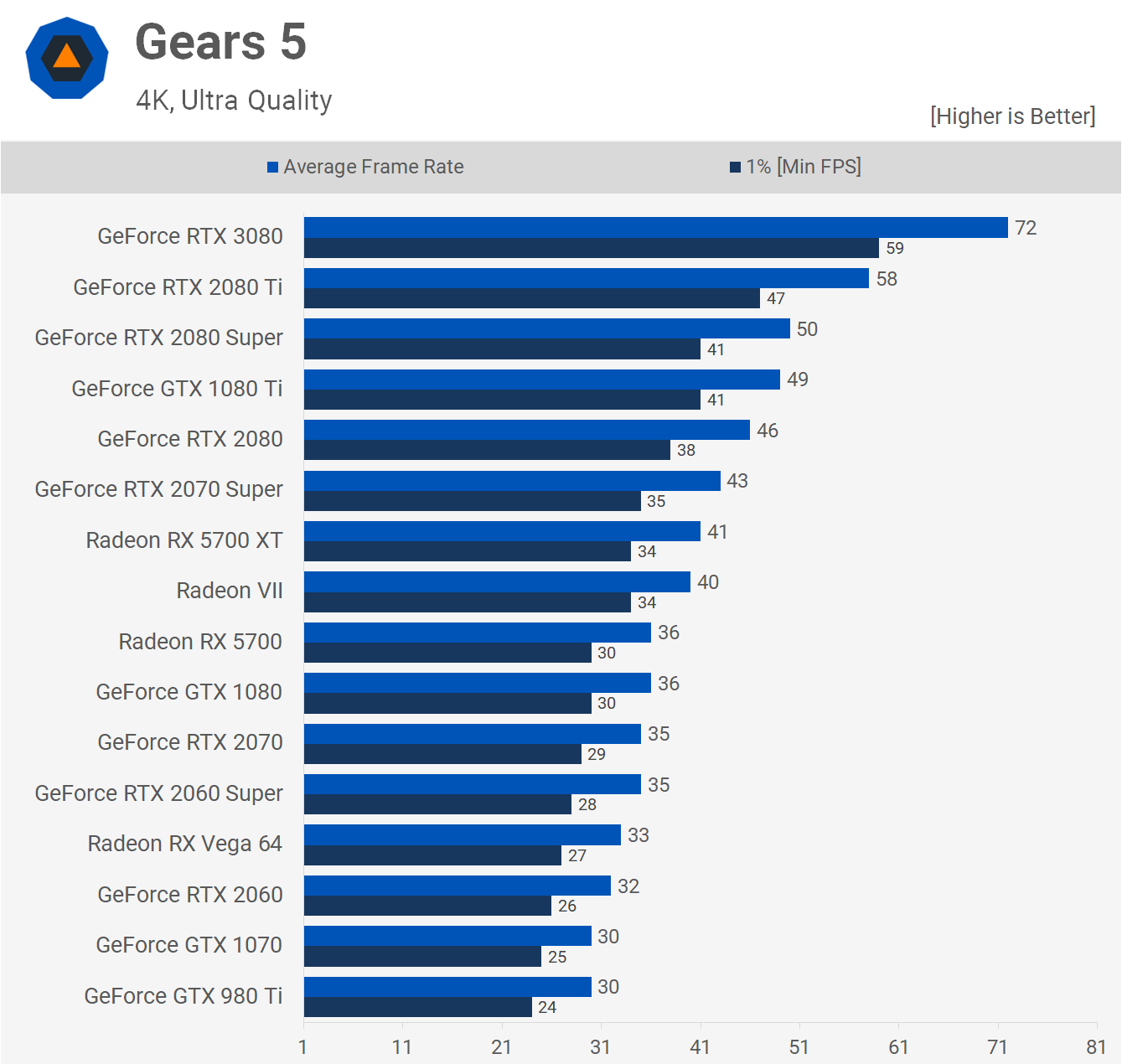
Again increasing the resolution to 4K helps widening the gap and at present the RTX 3080 is 47% faster than the GTX 1080 Ti.

This time we're looking at a 33% performance uplift for the RTX 3080 over the 2080 Ti at 1440p, so that'south i of the better performance gains nosotros've seen at this resolution so far.
It likewise means the new Ampere GPU was 76% faster than the GTX 1080 Ti which is a meaning performance uplift and nosotros too saw an nigh 70% increase over the RTX 2080, so we're very impressed with these results.

And of course, they merely go improve at 4K.
The RTX 3080 was a whopping 43% faster than the 2080 Ti, a massive operation uplift. It's besides 83% faster than the 2080 and 92% faster than the 1080 Ti. Those are some of the best margins we've seen so far and certainly appear to be a best case scenario for the RTX 3080.
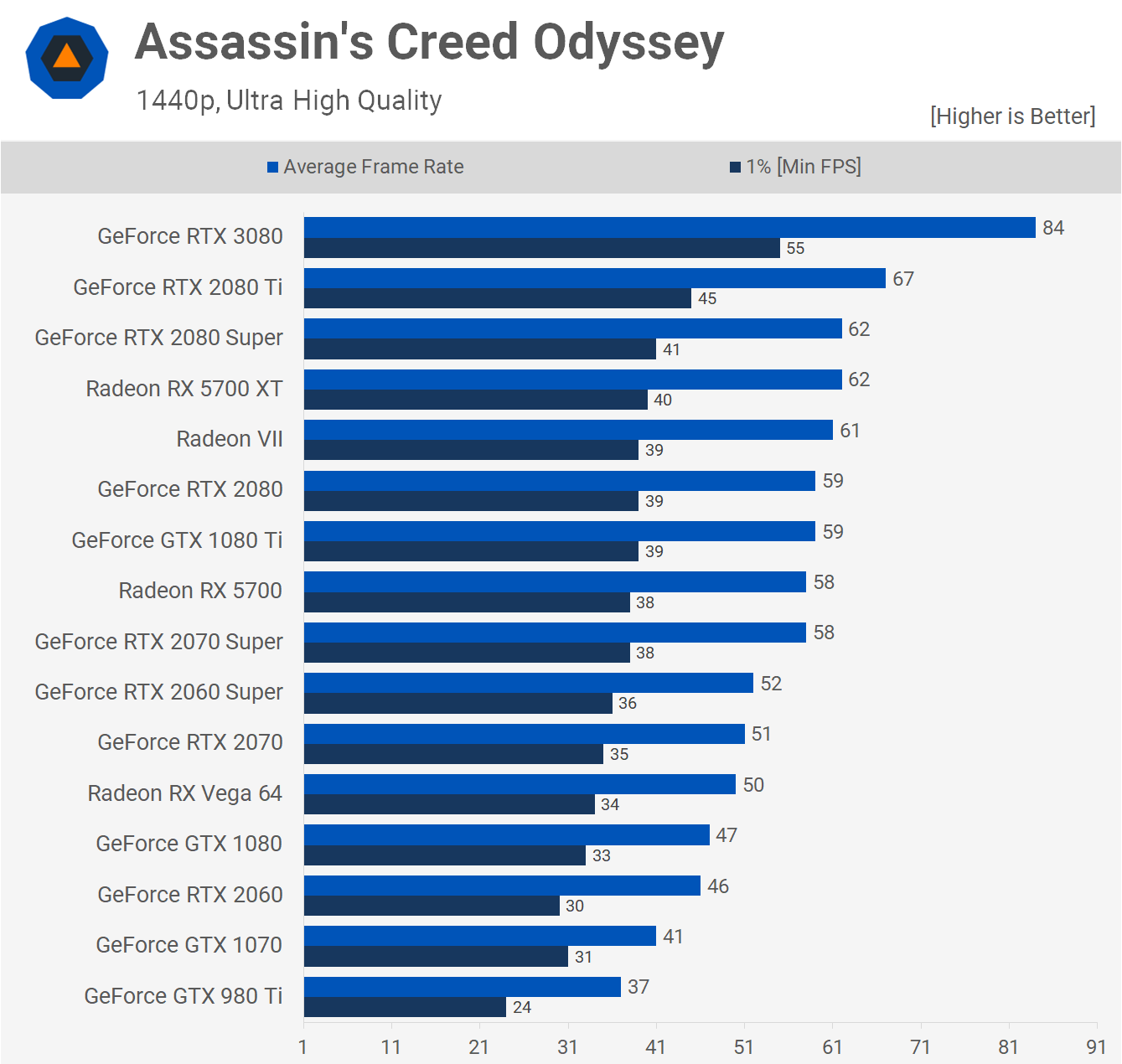
With Assassin's Creed Odyssey we're back to milder gains at 1440p. The RTX 3080 leads the 2080 Ti by a 25% margin and the 1080 Ti and 2080 by 42%. We know it sounds strange to say "just 42%" but remember the 1080 Ti cost the same corporeality every bit the 3080 when released 3.five years ago.

At 4K, the RTX 3080 provides a 35% performance bump over the 2080 Ti and it was 51% faster than the 1080 Ti and 2080.

With no help from dynamic resolution scaling, the RTX 3080 pumped out 190 fps on average at 1440p in World War Z using the maximum in-game quality settings.
That'due south a stunning frame charge per unit, though only a ~17% heave over the 2080 Ti and 42% over the 2080. We should notation that the 3950X does create a pocket-size bottleneck in WWZ at 1440p, yet the margins are virtually identical on the Core i9-10900K, moving by a few percent in the 3080's favor.

Moving to 4K shows the RTX 3080's prowess, it'due south now 34% faster at 4K than the 2080 Ti which is a massive improvement.

Adjacent up we have Metro Exodus and the 3950X does go a problem in this championship. This is a rare instance where the Ryzen CPU heavily limits functioning at 1440p and as a issue the RTX 3080 suffers. That's nonetheless a 25% heave over the RTX 2080, but let'south meet what happens at 4K...

At 4K we're no longer CPU limited and there is a 35% uplift over the 2080 Ti and 70% over the 2080.
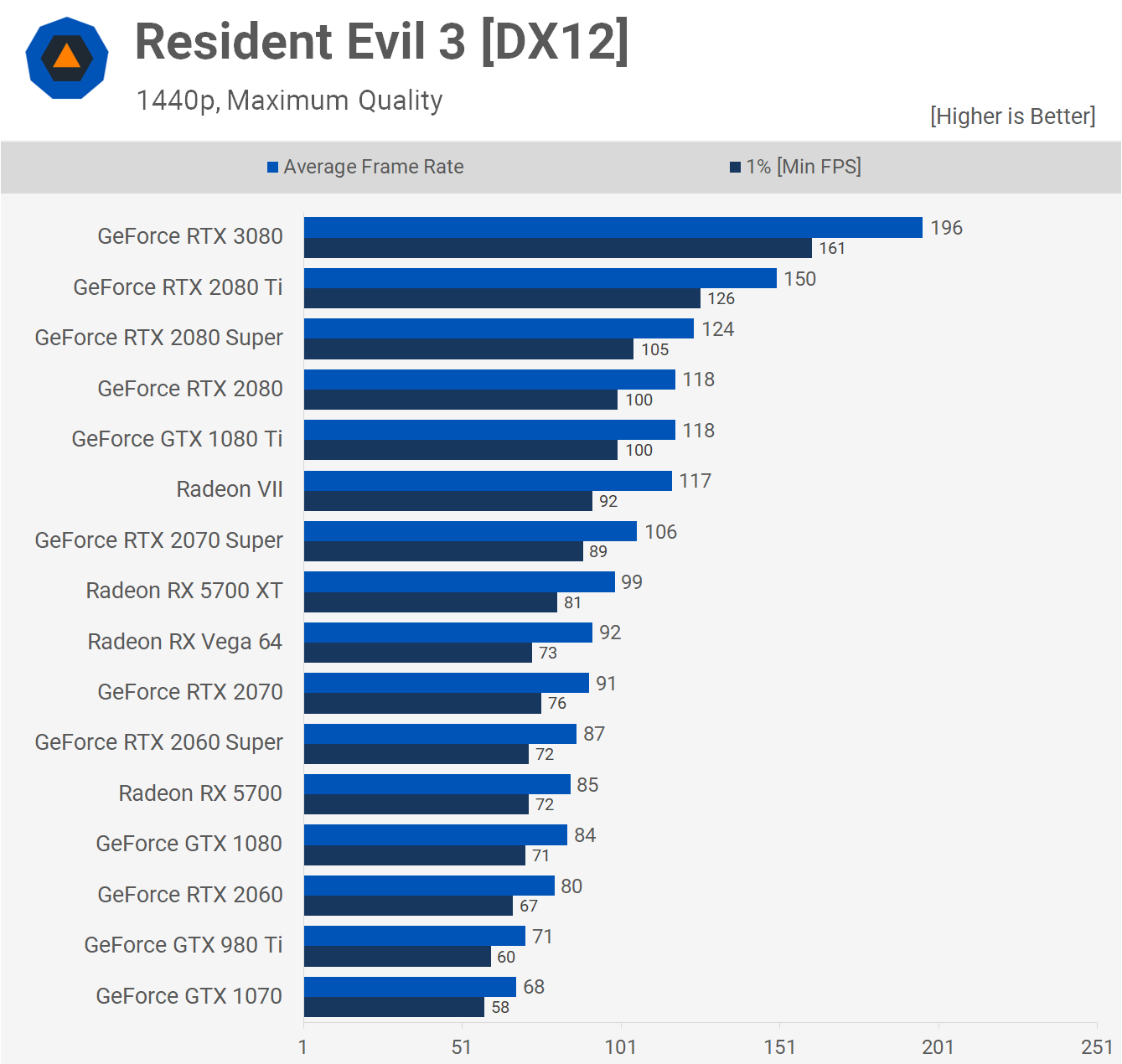
Moving on to Resident Evil three, we see an impressive 196 fps boilerplate from the RTX 3080 when using the best visual quality settings. That meant it was 31% faster than the 2080 Ti and 66% faster than both the GTX 1080 Ti and RTX 2080.
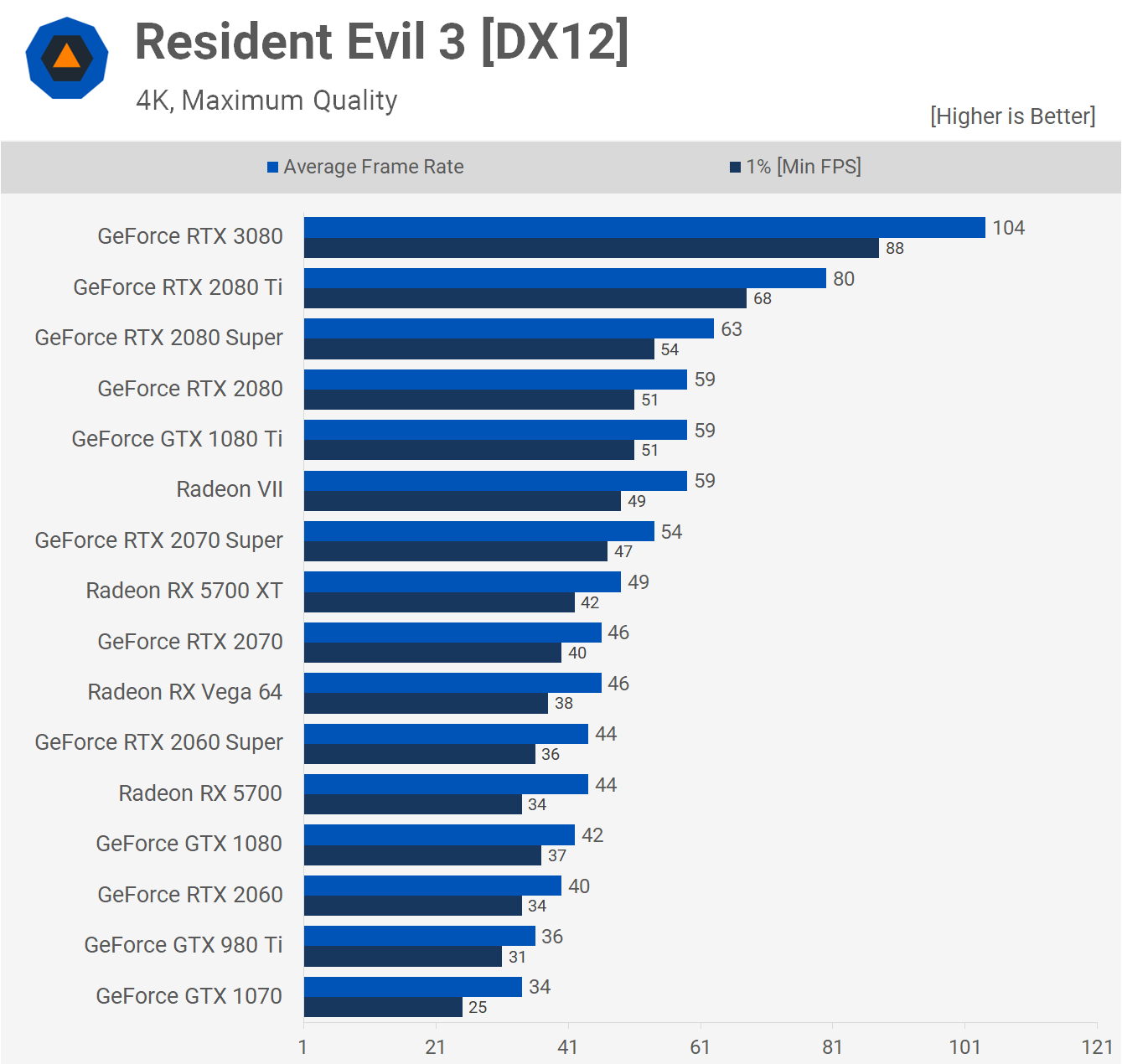
Jumping up to the 4K resolution and we're seeing just over 100 fps on average for a thirty% boost over the 2080 Ti and a massive 76% improvement over the RTX 2080 and GTX 1080 Ti
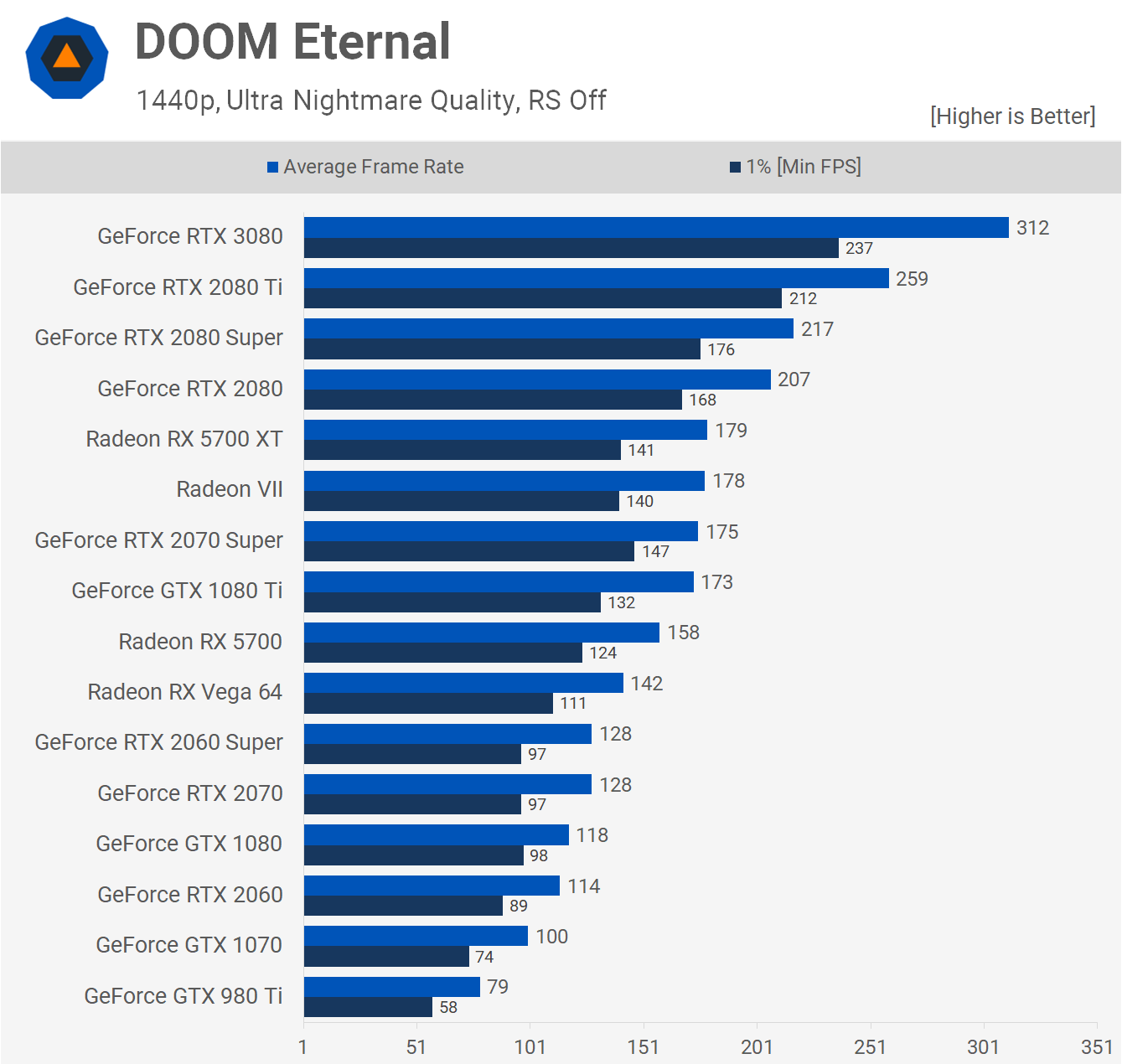
Doom Eternal has been heavily touted past Nvidia to show off RTX 3080 performance and you lot'll see why one time we move to the 4K testing. At 1440p the results aren't overly impressive as the 3080 is ~20% faster than the 2080 Ti and 51% faster than the 2080. Again, l% remains an impressive gain.
Now moving to 4K we run across some interesting stuff using the 'Ultra Nightmare' preset, which in our test sees 9GB of VRAM used.

Here the 3080 was 35% faster than the 2080 Ti, just quite incredibly 115% faster than the 2080. Likewise it was 93% faster than the 1080 Ti which does well here relative to the 2080 cheers to the extra VRAM.
This detail test is why many are expecting/challenge up to 100% performance gains over the 2080 after seeing Digital Foundry's Nvidia promo video. The data is accurate, but without more information can exist somewhat misleading.
And hither is more data. By leaving all other options on 'Ultra Nightmare' with the exception of texture pool size, which nosotros dropped to 'Ultra' reducing VRAM usage to 7GB, this is what we find...

In that location is no change in performance with GPUs packing 10GB or more VRAM, but for those with 8GB like the RTX 2080, nosotros're seeing a 26% performance uplift and that means the 3080 is now 70% faster, not 115% faster.
Nosotros'll discuss this farther, but for now let's move on to Wolfenstein: Youngblood.

Starting with the 1440p information we meet that the RTX 3080 is skillful for 242 fps on average as it additional performance over the 2080 Ti by a 22% margin and 55% over the 2080. Adequately typical gains at that place for 1440p.

At present at 4K nosotros're looking at 142 fps on average with the 3080 which is extremely impressive, just 22% faster than the 2080 Ti, but 60% faster than the 2080 which is a pretty solid proceeds.

Finally we have Hitman 2 results and this is another rare instance where the Ryzen 9 3950X limits performance at 1440p and as a event the RTX 3080 is only v% faster than the 2080 Ti. Nosotros as well tested using the Core i9-10900K and with the Intel CPU the 3080 was marginally faster (ten%) at this resolution.

Pumping the resolution upwardly to 4K means nosotros're back to a GPU limitation and the RTX 3080 performs 29% faster than the 2080 Ti and 69% faster than the 2080. Over again we can see the Ampere GPU come to life at the 4K resolution.
Performance Summary
At that place is no escaping fact the RTX 3080 is very fast, particularly when compared to the 2080 GPU information technology replaces, simply it volition likewise need a capable system to continue all this power. We tested many dissimilar titles and the margins were a bit all over the place, so let's take a look at the 14 game average for all the GPUs tested and then we'll do a few head to heads looking at private titles.
14 Game Average at 1440p
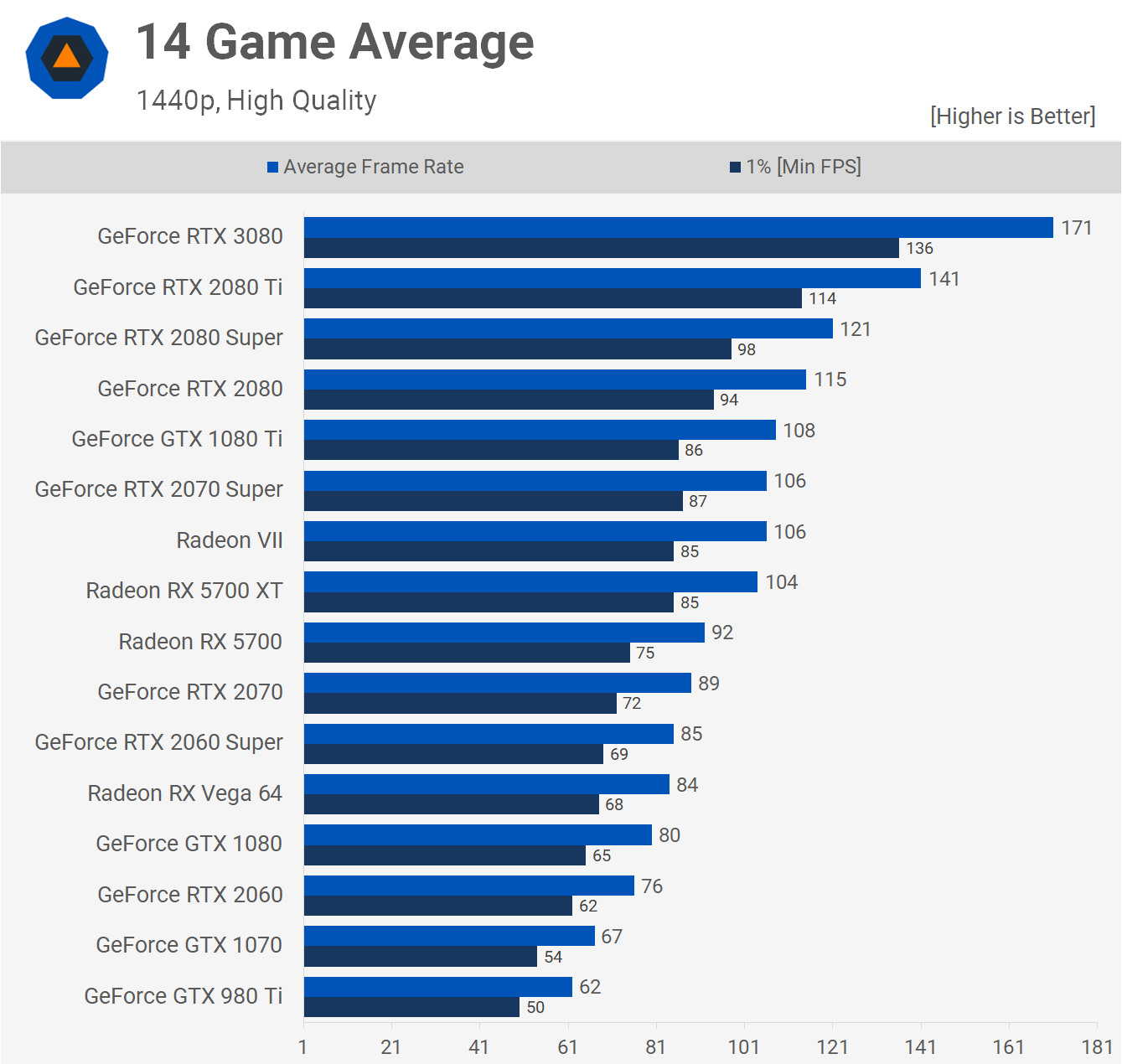
On average, the RTX 3080 is 21% faster than the 2080 Ti and 49% faster than the 2080 at 1440p. Information technology'south likewise 58% faster than the 1080 Ti and 113% faster than the vanilla 1080. And then nosotros're looking at roughly a 50% functioning boost at the $700 price betoken subsequently two years, at least for 1440p gaming.
14 Game Average at 4K
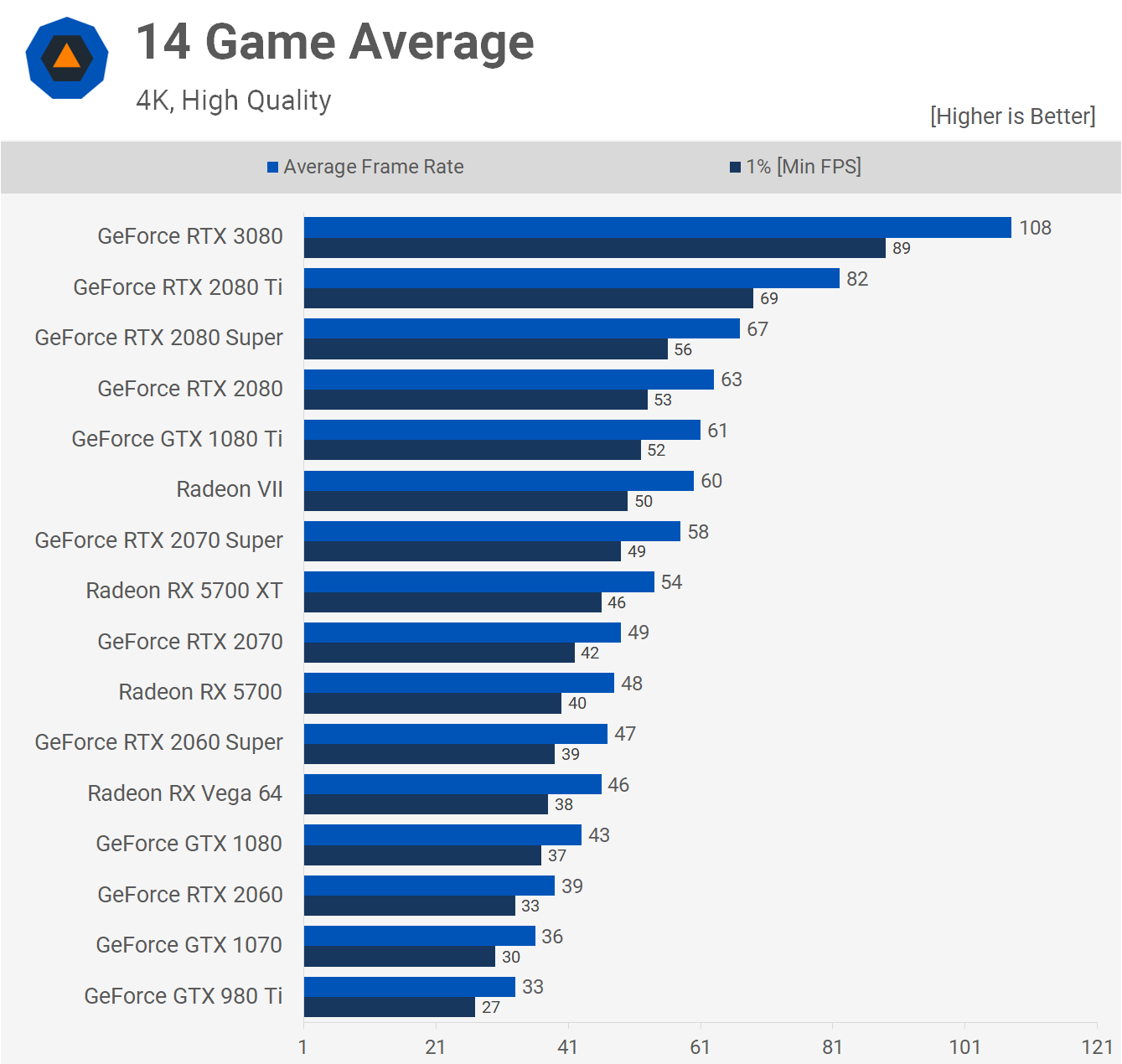
Playing games at 4K takes full advantage of what the GeForce RTX 3080 is capable of. At this resolution, information technology's 32% faster than the 2080 Ti, 71% faster than the RTX 2080 and 77% faster than the GTX 1080 Ti, on average. Those are far more impressive gains and makes Ampere a tremendous replacement at the same toll signal.
GeForce RTX 3080 vs 2080 Ti: fourteen Game Average at 1440p
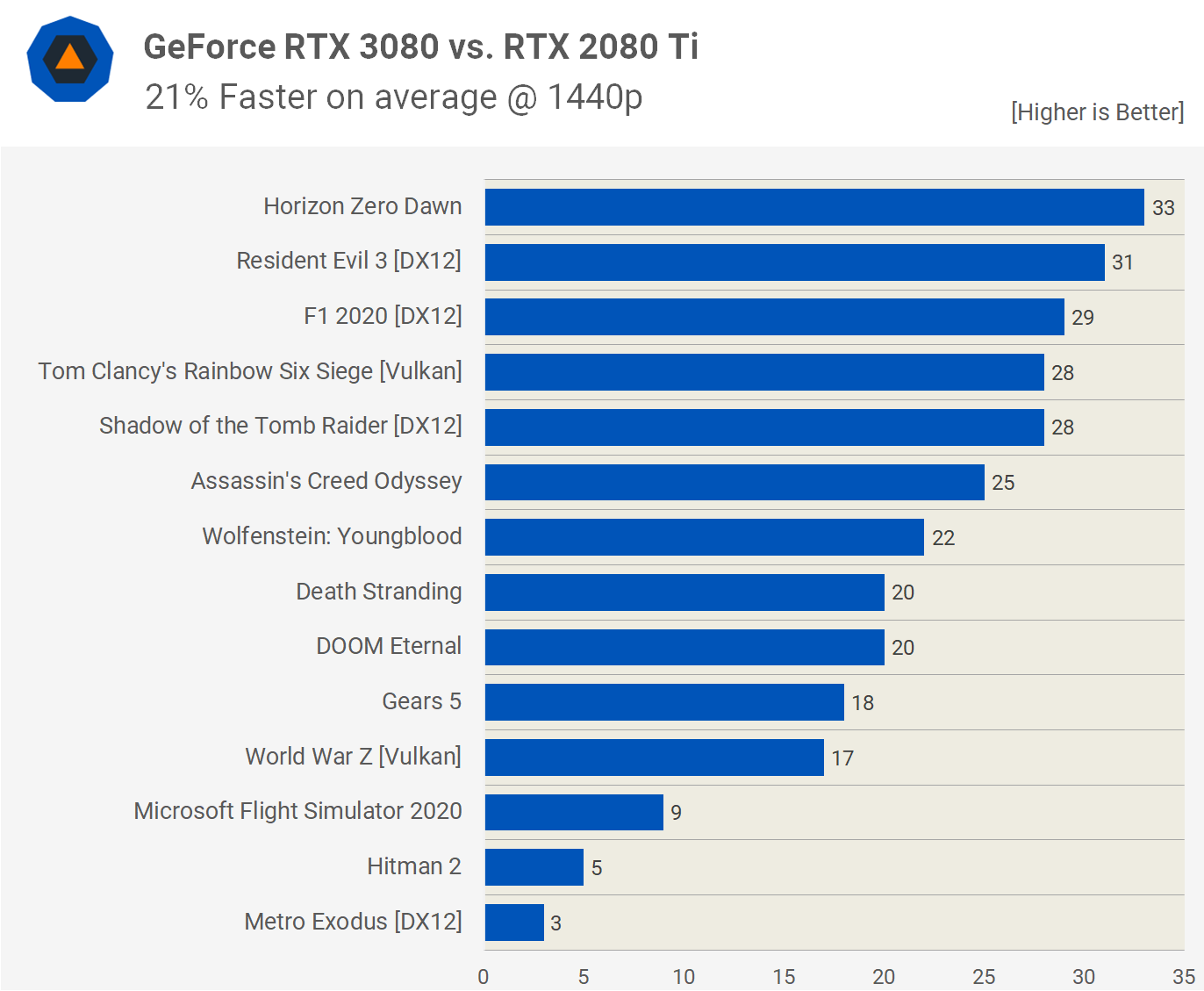
Hither'due south a look at the margins on a per game basis and please notation due to the way this information is calculated there tin be a small discrepancy in the totals when compared to the previous graphs. Equally earlier, the 3080 is 21% faster than the 2080 Ti at 1440p and hither we come across performance gains range anywhere from a few pct right up to 33%.
GeForce RTX 3080 vs 2080 Ti: 14 Game Average at 4K
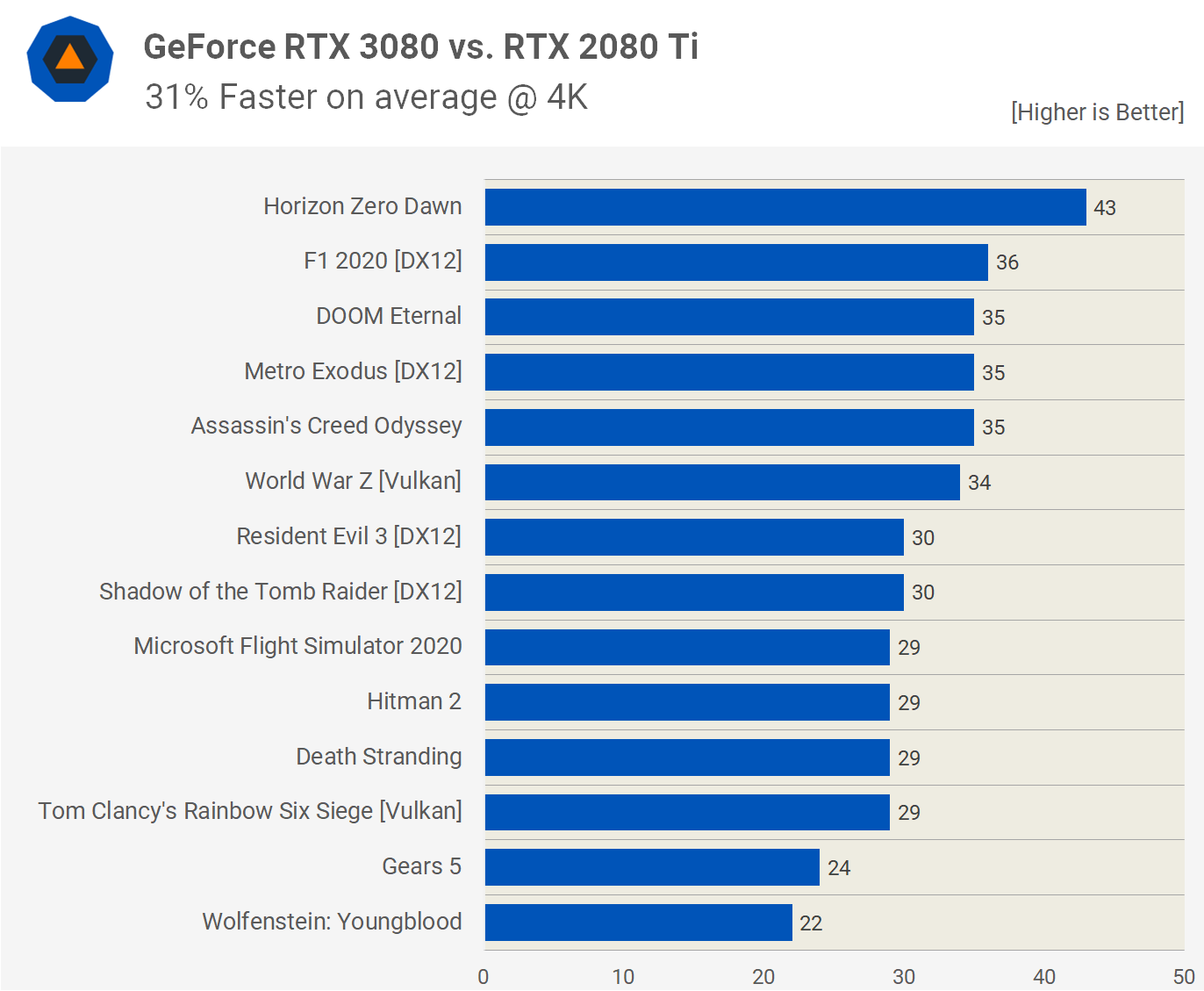
We encounter far more predictable margins at 4K and this has little to practice with the CPU used and much more to do with the Ampere architecture -- nosotros'll talk over this in better particular in the conclusion.
What nosotros see here are gains of at to the lowest degree 22%, with the biggest margin seen in Horizon Zero Dawn where the RTX 3080 was upwardly to 43% faster than the prev-gen 2080 Ti.
GeForce RTX 3080 vs RTX 2080: 14 Game Average at 1440p
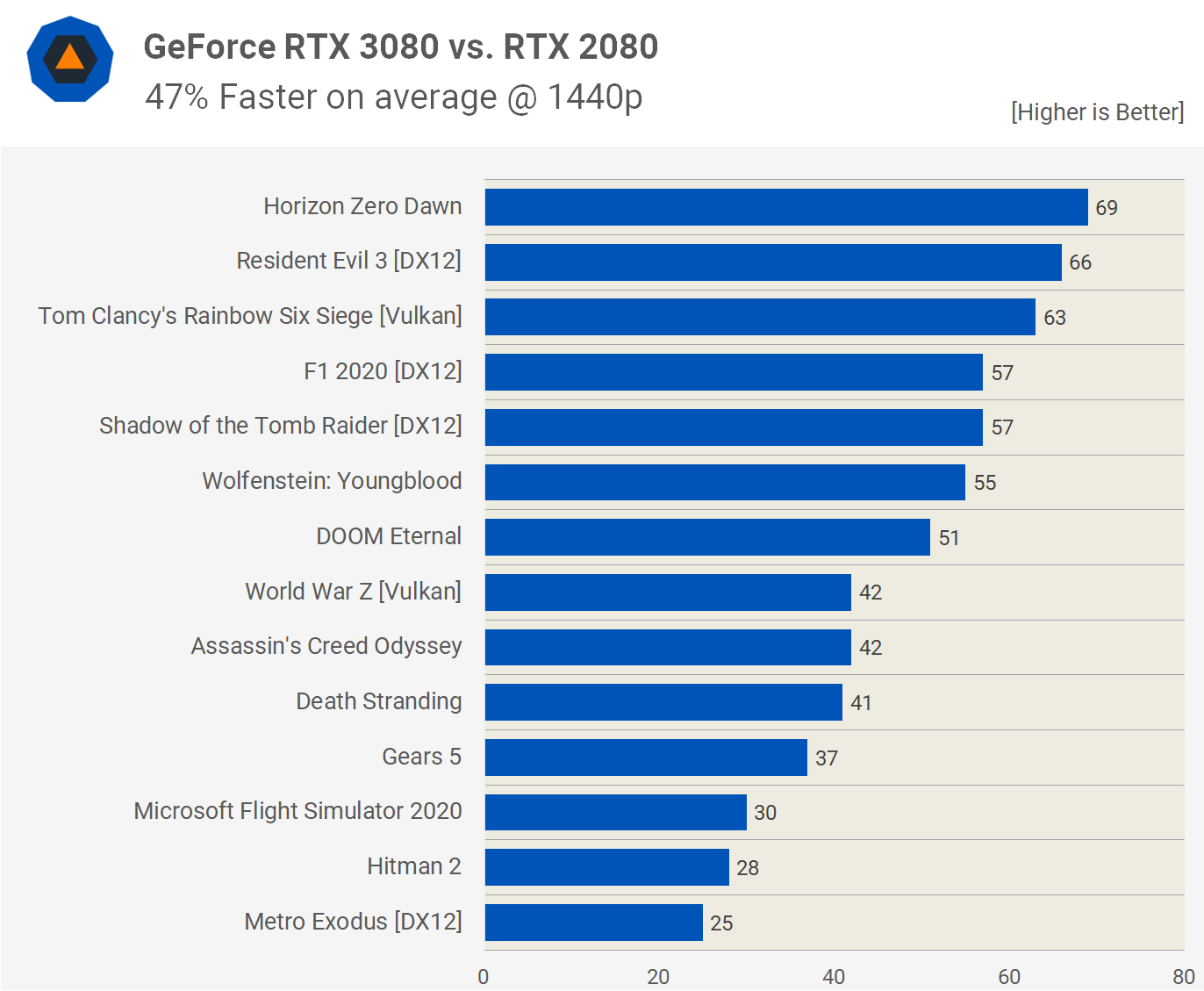
At 1440p nosotros run across less predictable gains even when compared to the RTX 2080. It's clear notwithstanding the 3080 is the more powerful GPU with margins going from 25% faster and so as big as 69%.
GeForce RTX 3080 vs RTX 2080: 14 Game Boilerplate at 4K
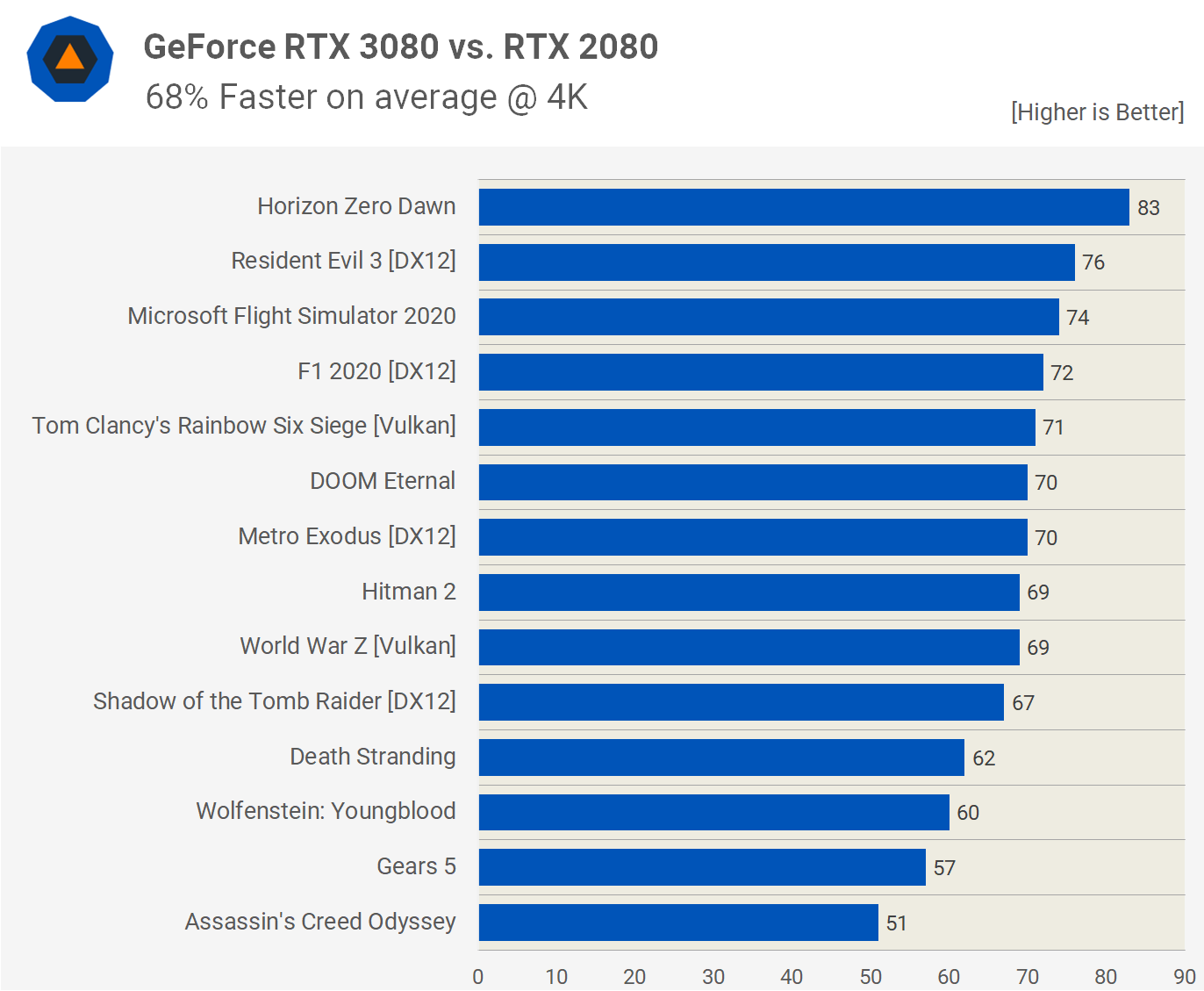
At 4K, the new Ampere GPU can be anywhere from 51 to 83% faster. Looking at this information you could merely say the RTX 3080 is nigh 70% faster when gaming at 4K.
Besides note that we used the 7GB VRAM data for Doom here as the 115% gain using the Ultra Nightmare preset was an outlier and not indicative of raw GPU performance.
Power Consumption
Now permit's take a wait at power consumption, starting with our total system power draw, and so literally everything in the PC is existence measured hither.
This is useful for a few reasons: first, information technology lets you know roughly what kind of power supply you'd need for a sure configuration. It also lets you know just how much difference in power draw at that place is between say the 2080 Ti and 3080 when factoring in the entire gaming system.

We're looking at a large 21% increase in total system usage equally the RTX 3080 pushes our test system upwards to 523 watts. That's beyond what we saw with the GTX 1080 Ti and Vega 64 to name two power hungry graphics cards. And then the RTX 3080 does suck down a lot of power to output all that raw operation.
Using Nvidia's PCAT (Power Capture Analysis Tool) nosotros can accurately mensurate the power draw of the graphics card alone, including what it draws from the PCIe power connectors and the PCIe slot. It'south a seriously impressive tool and kudos go to Nvidia for providing it to testers, that's very cool of them.
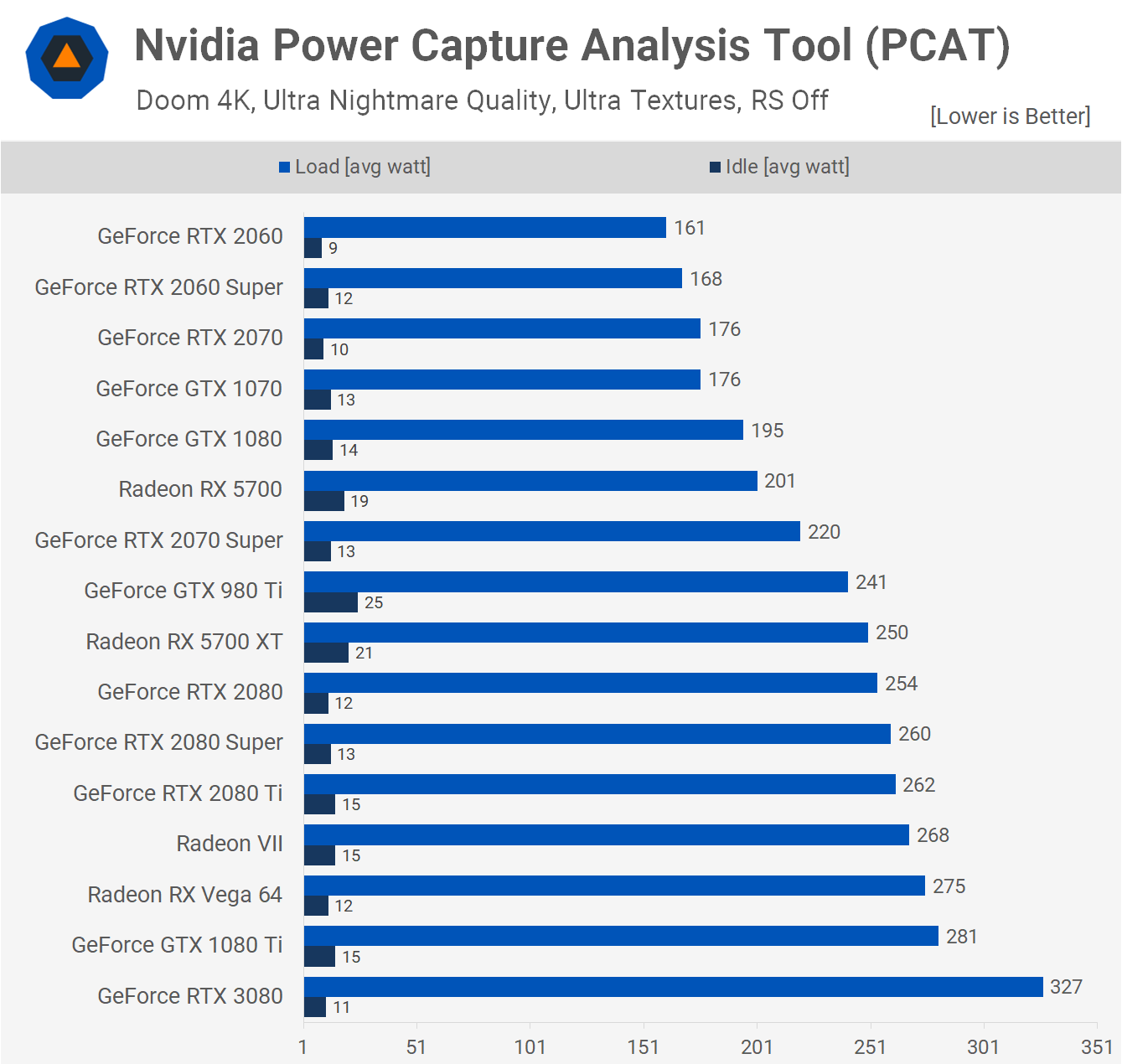
Here we can see that the RTX 3080 consumes 25% more than power than the 2080 Ti and 29% more than the RTX 2080. And while that'southward a lot of power, technically it is still more efficient. See beneath:

Hither we run into that the RTX 3080 offers the most performance per watt, so yous can't deny its efficiency. This is a first generation node compress GPU, meaning that if history serves any indication, in the futurity Nvidia will likely be able to meliorate upon this 8% generational efficiency proceeds.
For testing thermal operation of the RTX 3080 Founders Edition, we installed it in our Corsair Obsidian 500D test organization and let it run for an hr in F1 2022 while maintaining a room temperature of 21C. Afterward that point the GPU peaked at just 77C and maintained a core clock speed of around 1830 MHz.

This had the graphics card fans spinning at up to 1900 RPM where they could exist heard simply we're not overly loud. Nosotros don't take any audio measurements right at present, but we constitute the Atomic number 26 model to perform well and given the performance and power draw we were pleasantly surprised. Nosotros'll say the carte does tend to bleat a lot when pumping out over 300 fps, and then if yous are sensitive to gyre whine, a frame cap will be in order.
Price Per Frame
One primal metric we like to employ is cost per frame and at $700 the RTX 3080 will be delivering the goods, even at 1440p.
You all know we liked the value of the Radeon 5700 XT and hither we're seeing that level of value despite offering a 64% performance boost. The RTX 3080 can roughly friction match the price per frame of the Navi GPU and it's also 33% cheaper per frame when compared to the RTX 2080.

Still, if we await at the 4K performance, the cost per frame gets even better, much meliorate.
Here the RTX 3080 is the well-nigh affordable graphics menu released in the last iv years when it comes to cost per frame (value), chirapsia even the base model RX 5700 which is almost ridiculous.
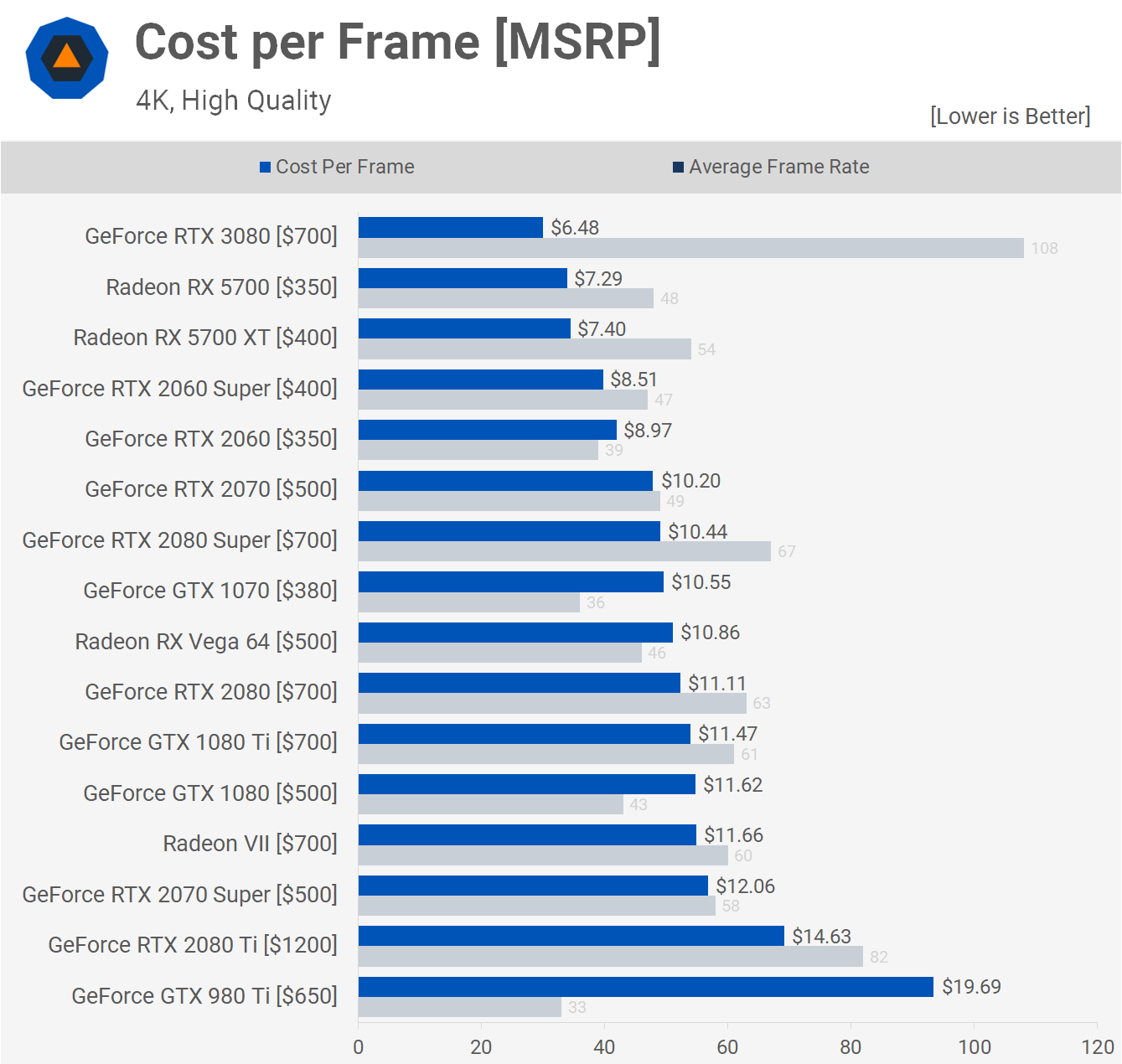
DLSS / Ray Tracing
We plan to follow upward with a more detailed analysis of DLSS and ray tracing on Ampere on a dedicated article, but for the time being, here's a quick look at both in Wolfenstein Youngblood.
When enabling Ray Tracing the RTX 3080 suffers a 38% performance hit which is better than the 46% performance hit the 2080 Ti suffers. And then if nosotros enable DLSS with ray tracing the 3080 drops merely 20% of its original performance which is marginally amend than the 25% drop seen with the 2080 Ti. The deltas are not that much different, the RTX 3080 is just faster to brainstorm with.
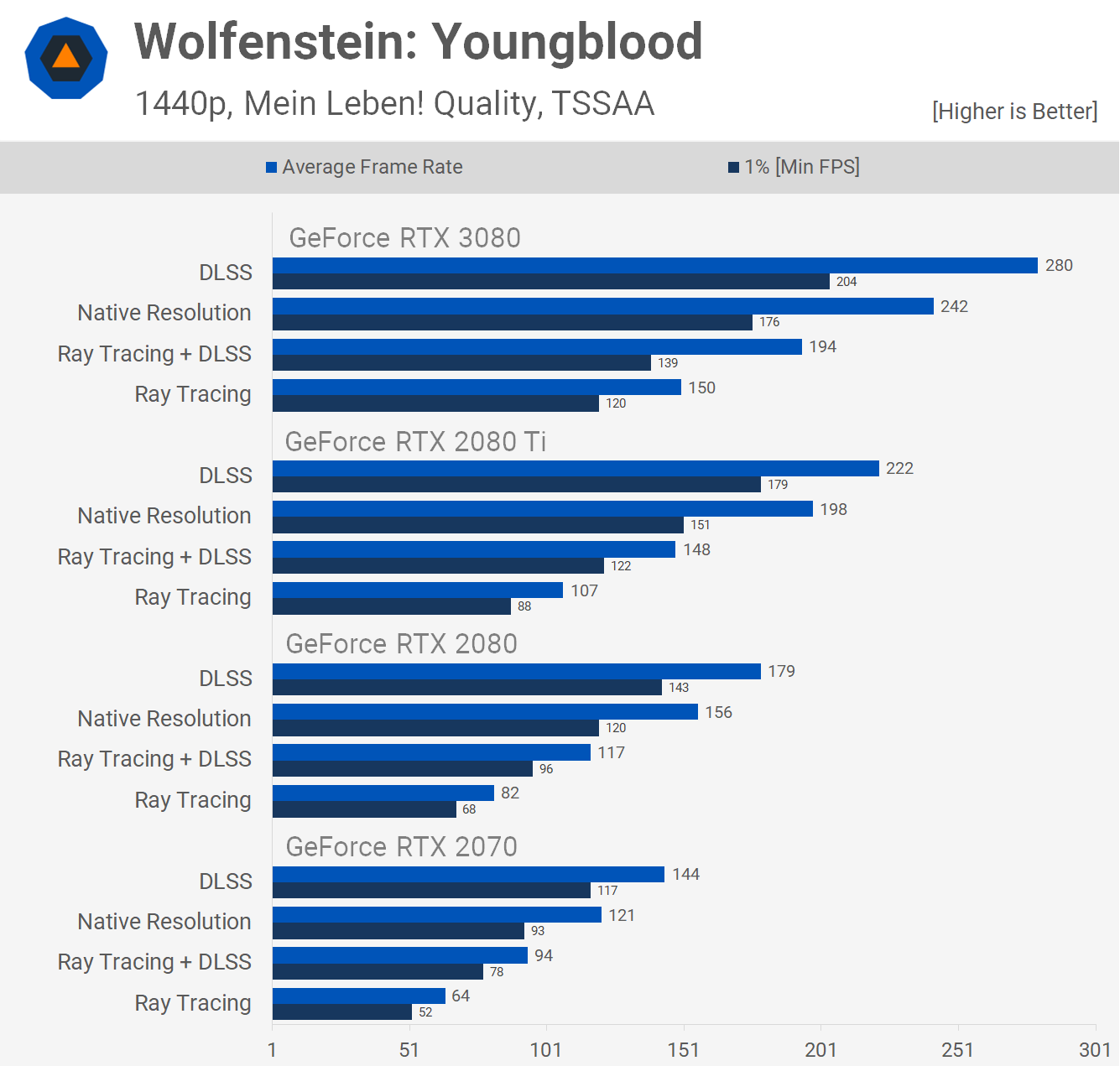
Using but DLSS sees a xvi% performance heave in the RTX 2080. So permit's see if things change much at 4K.
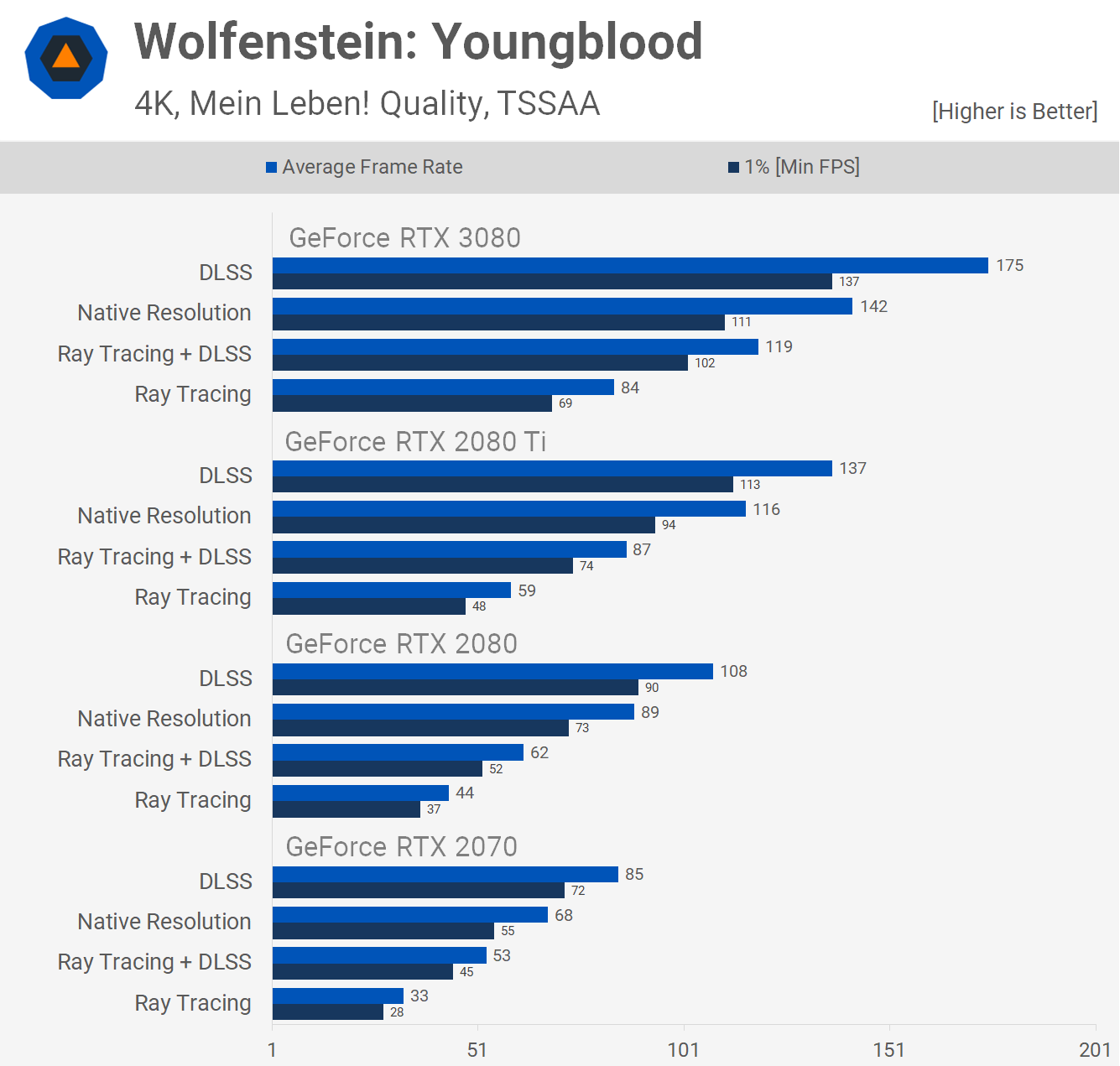
Hither the RTX 3080 was good for 142 fps when running at the native resolution without any RTX features enabled. Enabling ray tracing reduces functioning past 41% to 84 fps on boilerplate, which is reasonable performance, but still a massive fps drop. For comparison the RTX 2080 Ti saw a 49% drop.
When using DLSS, the 2080 Ti sees an 18% performance heave whereas the 3080 sees a 23% spring. At least in this game implementation, information technology looks like the 3080 is faster at stuff like ray tracing considering it's a faster GPU and not necessarily because the 2nd-gen RT cores are making a difference. We'll test more than games in the weeks to come up, of course.
Testing with AMD vs. Intel CPUs
There are a number of reasons why we switched to a Ryzen CPU for game testing moving forward (this was discussed and outlined in this article). But the most important one was that the change wouldn't influence results or manipulate numbers in charts like our cost per frame summary.
Looking at how the 3950X and 10900K compare with the RTX 3080 and 2080 Ti at 1440p across our 14 game sample, the 10900K was four% faster with the 2080 Ti and 6% faster with the 3080, that 2% margin is not going to skew the results.
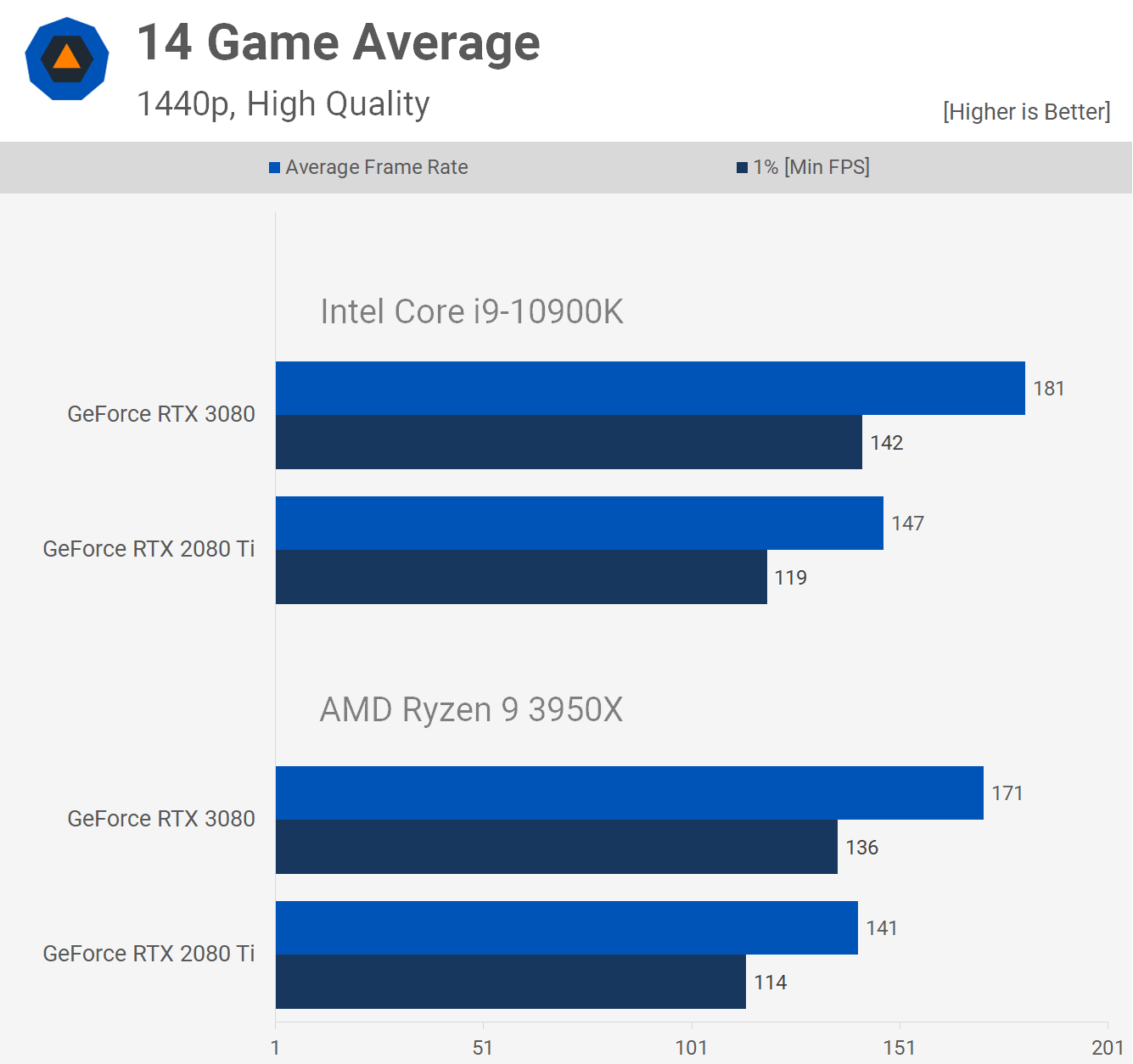
Then at 4K we can appreciate that in that location'due south no deviation at all between the two CPUs as both pushed the RTX 3080 to the same 108 fps average.

What We Learned
This is only the get-go of the journeying for Ampere GPUs and RTX 30 series graphics cards, just there you lot have it, that's the new GeForce RTX 3080 in a nutshell. We've got many more tests that we want to show you and many more nosotros want to run, only for now you should have a pretty skilful idea of what's on offer.
A large seventy% functioning leap over the RTX 2080 at 4K is impressive, and a huge improvement in cost per frame, and so that'south a job well done past Nvidia.
Now, that big spring won't be experienced across the lath, or more specifically, we saw less consistent improvements at 1440p where the RTX 3080 could shell the 2080 by as much equally 70%, but as well by as piddling as 25% (for a ~l% performance gain on average). That 50% boost is still groovy to see fifty-fifty though in terms of raw performance at the $700 price point we tin look two years dorsum to the RTX 2080 release or 3.5 years since the GTX 1080 Ti was released.

We've looked deeper at the RTX 3080's functioning at 1440p, so we want to comment on that. As far as nosotros can tell, CPU bottlenecking alone is not the explanation. The reason comes down to Ampere's architecture and the change to the SM configuration that we mentioned in the introduction. The 2x FP32 design tin only be fully utilized at 4K and beyond. This is because at 4K the portion of the return time per frame is heavier on FP32 shaders. At lower resolutions like 1440p, the vertice and triangle load is identical to what nosotros see at 4K, but at the higher resolution pixel shaders and compute effect shaders are more than intensive and take longer and therefore tin fill up the SMs FP32 ALUs better.
We frequently see loftier performance GPUs better utilized at higher resolutions for similar reasons, so that in itself isn't unusual. Higher resolutions always practise a improve job of putting core-heavy GPUs to piece of work, and they too help minimize other organization bottlenecks. The 2080 Ti, for instance, extends its pb over the 2080 at 4K, going from 23% faster at 1440p to 28% faster at 4K and that's with the lower quality textures in Doom, where memory capacity is not a factor. We're talking most a minor v% discrepancy, the scaling at 1440p and 4K looks very similar, and the 3950X can also be blamed for a minor part of that departure. However with the RTX 3080 we're talking about a 21% margin over the 2080 Ti at 1440p then a much larger 32% margin at 1440p (again, VRAM plays no part in the comparison). And our explanation hither is that Ampere is a compute heavy, datacenter and AI optimized compages that goes across gaming needs.

Current RTX 2080 owners targeting high-refresh rates at 1440p will see a 50% functioning heave, which is yet pretty sweet. The fact that the RTX 3080 simply excels at 4K gaming could be seen as the cherry on top. Doesn't necessarily future proof the GPU nevertheless, as Nvidia paired information technology with 10GB of VRAM which might prove insufficient in a year or two, though PCIe iv.0 will be a lot more than useful in mitigating those operation loses in modern platforms.
In the current market the GeForce RTX 3080 is an excellent value product.
We only have to look at the toll per frame data to run into that the RTX 3080 is a massive comeback over the RTX 2080 in terms value, it's even better value than the RTX 2060 and comparable to the 5700 XT which not anybody was addicted of. In the electric current market the GeForce RTX 3080 is an excellent value product, one of those rare instances where a high-end production is as well a slap-up value. This may be helped by an overpriced GeForce 20 series (we called this ane at launch), but the fact is, those RTX boards still flew off shelves no matter what.
In the coming months nosotros're bound to see more of Ampere, but also some competition from AMD and eventually Intel. Nosotros're looking forward to that, though clearly Nvidia has upped the ante on this generation. Arguably Nvidia has given AMD an opportunity to strike with a gaming focused architecture, only we'll just have to wait and see on that ane.
Every bit for ray tracing and DLSS, our stance on that hasn't changed. The technology is nifty, and we're glad it hasn't been used as key selling points of Ampere, it'southward now just a prissy bonus and of form, information technology will affair more over again games bring proper support for them.
Bottom line, nosotros're very pleased with what the GeForce RTX 3080 delivers at the $700 price point, and information technology's a hell of a lot better than what nosotros got last generation. I personally would take not bought an RTX 2080, but I would buy an RTX 3080.
Shopping Shortcuts:
- Nvidia GeForce RTX 3080 on Amazon
- Nvidia GeForce RTX 3070 on Amazon
- Nvidia GeForce RTX 3090 on Amazon
- Intel Core i9-10900K on Amazon
- AMD Ryzen 9 3950X on Amazon
- AMD Ryzen 9 3900X on Amazon
Source: https://www.techspot.com/review/2099-geforce-rtx-3080/
Posted by: kinglinevereting.blogspot.com


0 Response to "Nvidia GeForce RTX 3080 Review"
Post a Comment